History of Tourism and Travel
VerifiedAdded on 2020/01/28
|24
|4905
|117
Essay
AI Summary
This assignment delves into the history of tourism and travel, tracing its development across various periods. It examines the motivations behind travel, from early forms like trade and religion to leisure pursuits in modern times. The evolution of transportation methods, including river vessels, steam trains, and airlines, is also analyzed. Furthermore, the assignment highlights influential travelogues, letters, and diaries that shaped our understanding of tourism throughout history.
Contribute Materials
Your contribution can guide someone’s learning journey. Share your
documents today.
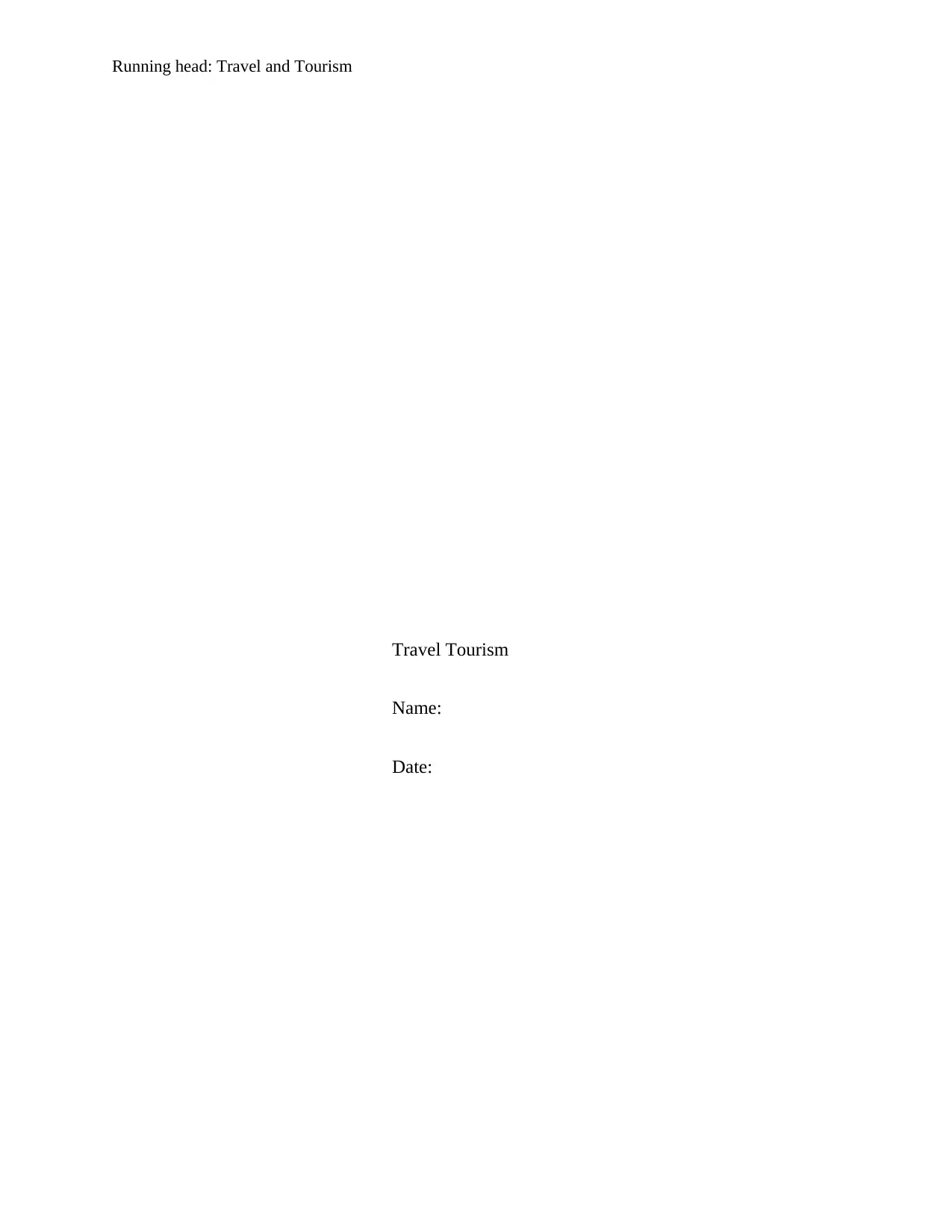
Running head: Travel and Tourism
Travel Tourism
Name:
Date:
Travel Tourism
Name:
Date:
Secure Best Marks with AI Grader
Need help grading? Try our AI Grader for instant feedback on your assignments.
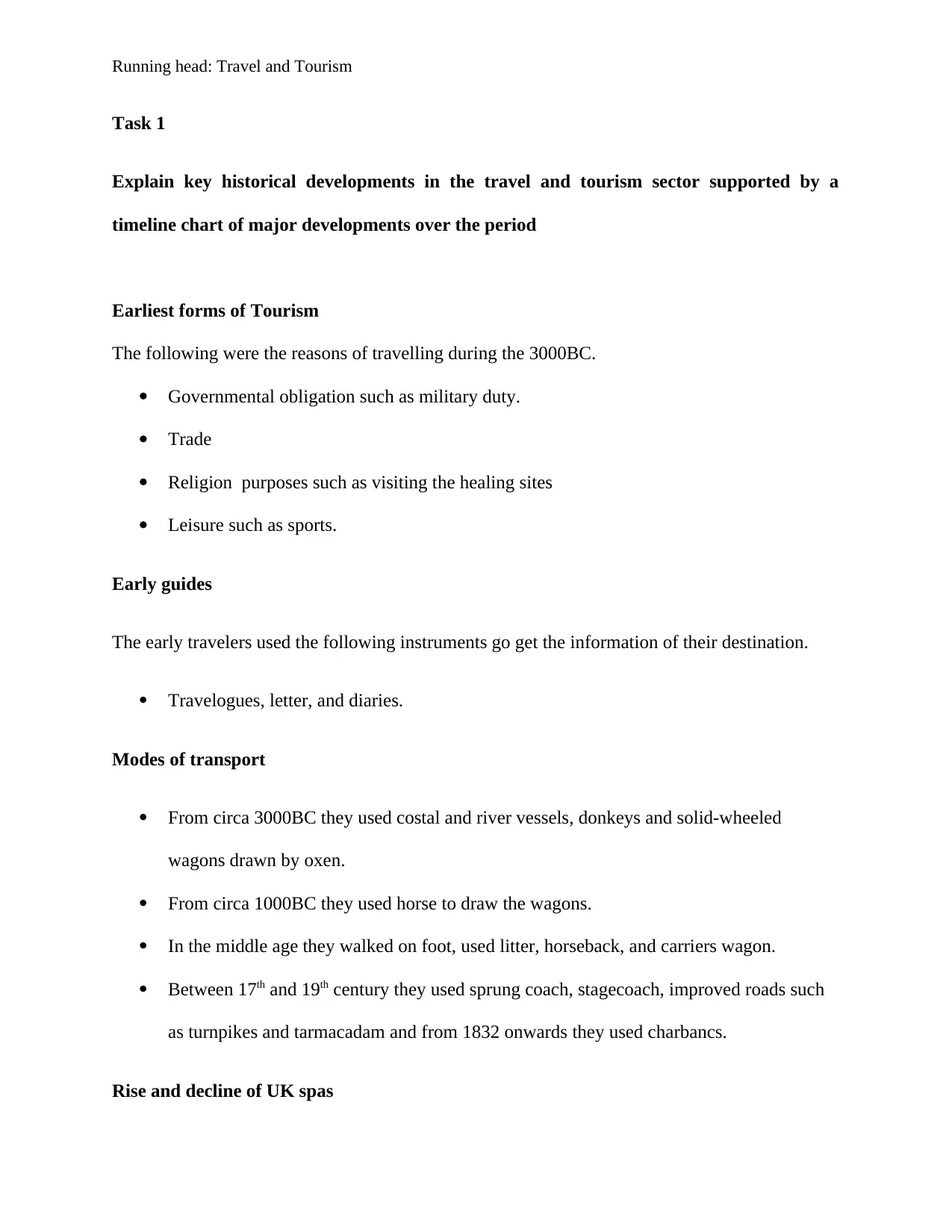
Running head: Travel and Tourism
Task 1
Explain key historical developments in the travel and tourism sector supported by a
timeline chart of major developments over the period
Earliest forms of Tourism
The following were the reasons of travelling during the 3000BC.
Governmental obligation such as military duty.
Trade
Religion purposes such as visiting the healing sites
Leisure such as sports.
Early guides
The early travelers used the following instruments go get the information of their destination.
Travelogues, letter, and diaries.
Modes of transport
From circa 3000BC they used costal and river vessels, donkeys and solid-wheeled
wagons drawn by oxen.
From circa 1000BC they used horse to draw the wagons.
In the middle age they walked on foot, used litter, horseback, and carriers wagon.
Between 17th and 19th century they used sprung coach, stagecoach, improved roads such
as turnpikes and tarmacadam and from 1832 onwards they used charbancs.
Rise and decline of UK spas
Task 1
Explain key historical developments in the travel and tourism sector supported by a
timeline chart of major developments over the period
Earliest forms of Tourism
The following were the reasons of travelling during the 3000BC.
Governmental obligation such as military duty.
Trade
Religion purposes such as visiting the healing sites
Leisure such as sports.
Early guides
The early travelers used the following instruments go get the information of their destination.
Travelogues, letter, and diaries.
Modes of transport
From circa 3000BC they used costal and river vessels, donkeys and solid-wheeled
wagons drawn by oxen.
From circa 1000BC they used horse to draw the wagons.
In the middle age they walked on foot, used litter, horseback, and carriers wagon.
Between 17th and 19th century they used sprung coach, stagecoach, improved roads such
as turnpikes and tarmacadam and from 1832 onwards they used charbancs.
Rise and decline of UK spas
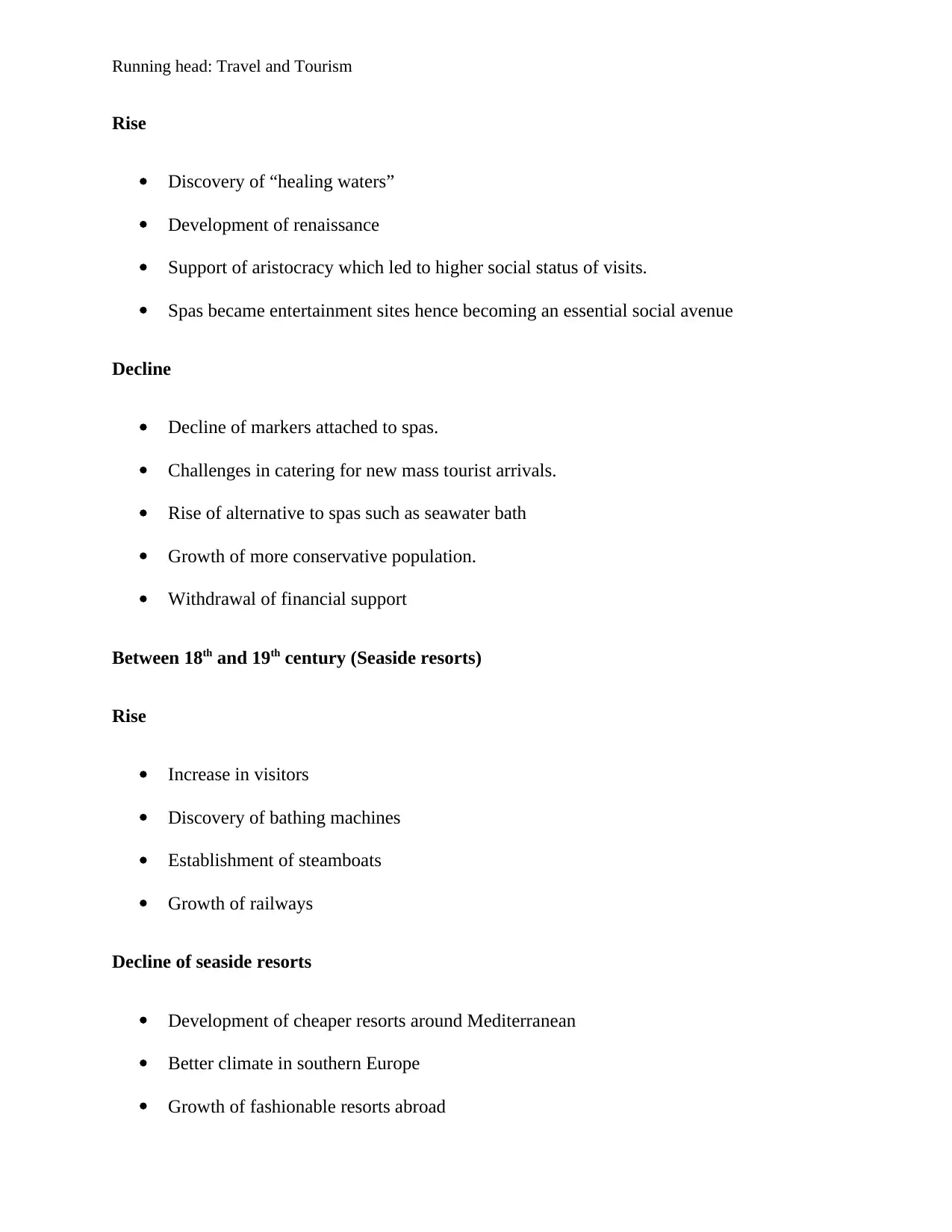
Running head: Travel and Tourism
Rise
Discovery of “healing waters”
Development of renaissance
Support of aristocracy which led to higher social status of visits.
Spas became entertainment sites hence becoming an essential social avenue
Decline
Decline of markers attached to spas.
Challenges in catering for new mass tourist arrivals.
Rise of alternative to spas such as seawater bath
Growth of more conservative population.
Withdrawal of financial support
Between 18th and 19th century (Seaside resorts)
Rise
Increase in visitors
Discovery of bathing machines
Establishment of steamboats
Growth of railways
Decline of seaside resorts
Development of cheaper resorts around Mediterranean
Better climate in southern Europe
Growth of fashionable resorts abroad
Rise
Discovery of “healing waters”
Development of renaissance
Support of aristocracy which led to higher social status of visits.
Spas became entertainment sites hence becoming an essential social avenue
Decline
Decline of markers attached to spas.
Challenges in catering for new mass tourist arrivals.
Rise of alternative to spas such as seawater bath
Growth of more conservative population.
Withdrawal of financial support
Between 18th and 19th century (Seaside resorts)
Rise
Increase in visitors
Discovery of bathing machines
Establishment of steamboats
Growth of railways
Decline of seaside resorts
Development of cheaper resorts around Mediterranean
Better climate in southern Europe
Growth of fashionable resorts abroad
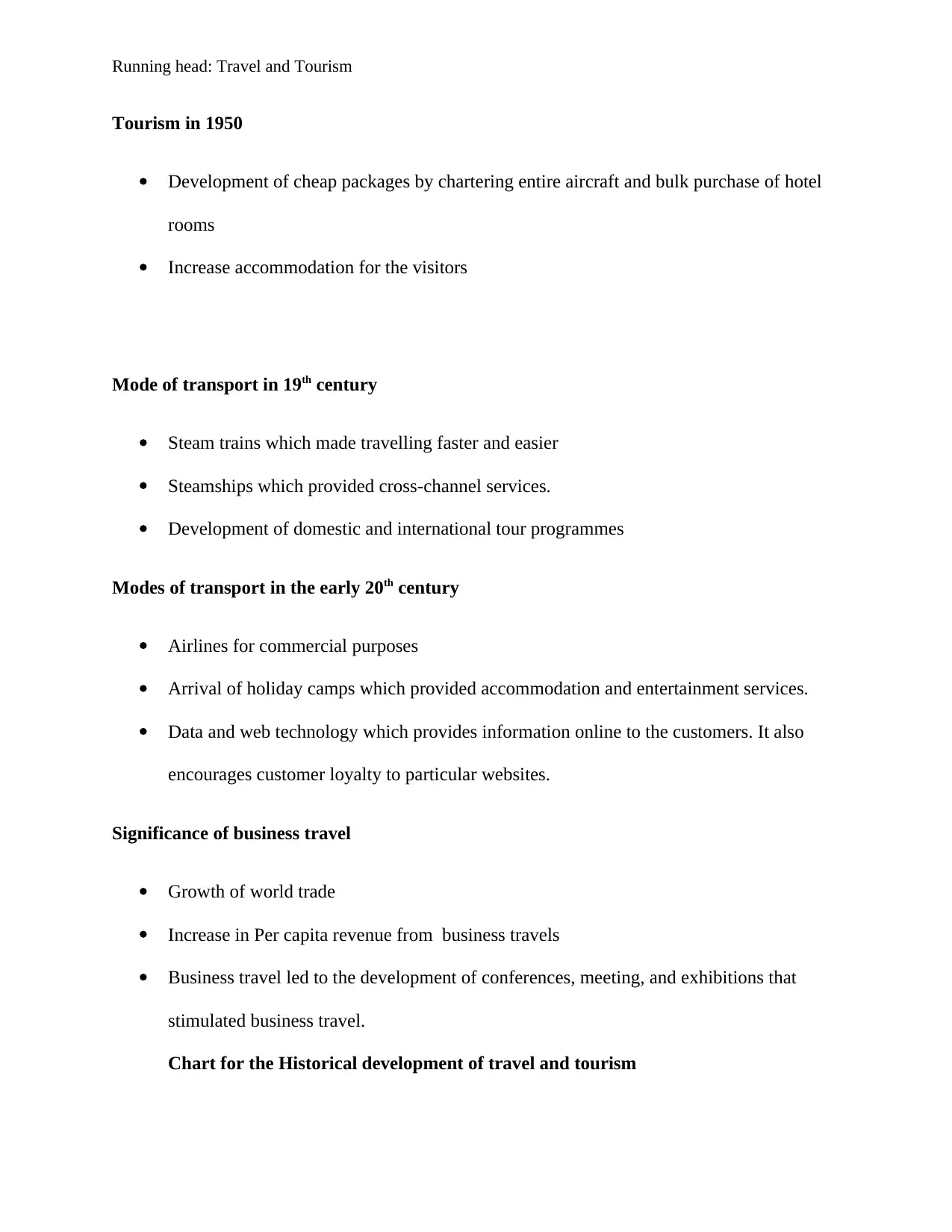
Running head: Travel and Tourism
Tourism in 1950
Development of cheap packages by chartering entire aircraft and bulk purchase of hotel
rooms
Increase accommodation for the visitors
Mode of transport in 19th century
Steam trains which made travelling faster and easier
Steamships which provided cross-channel services.
Development of domestic and international tour programmes
Modes of transport in the early 20th century
Airlines for commercial purposes
Arrival of holiday camps which provided accommodation and entertainment services.
Data and web technology which provides information online to the customers. It also
encourages customer loyalty to particular websites.
Significance of business travel
Growth of world trade
Increase in Per capita revenue from business travels
Business travel led to the development of conferences, meeting, and exhibitions that
stimulated business travel.
Chart for the Historical development of travel and tourism
Tourism in 1950
Development of cheap packages by chartering entire aircraft and bulk purchase of hotel
rooms
Increase accommodation for the visitors
Mode of transport in 19th century
Steam trains which made travelling faster and easier
Steamships which provided cross-channel services.
Development of domestic and international tour programmes
Modes of transport in the early 20th century
Airlines for commercial purposes
Arrival of holiday camps which provided accommodation and entertainment services.
Data and web technology which provides information online to the customers. It also
encourages customer loyalty to particular websites.
Significance of business travel
Growth of world trade
Increase in Per capita revenue from business travels
Business travel led to the development of conferences, meeting, and exhibitions that
stimulated business travel.
Chart for the Historical development of travel and tourism
Secure Best Marks with AI Grader
Need help grading? Try our AI Grader for instant feedback on your assignments.
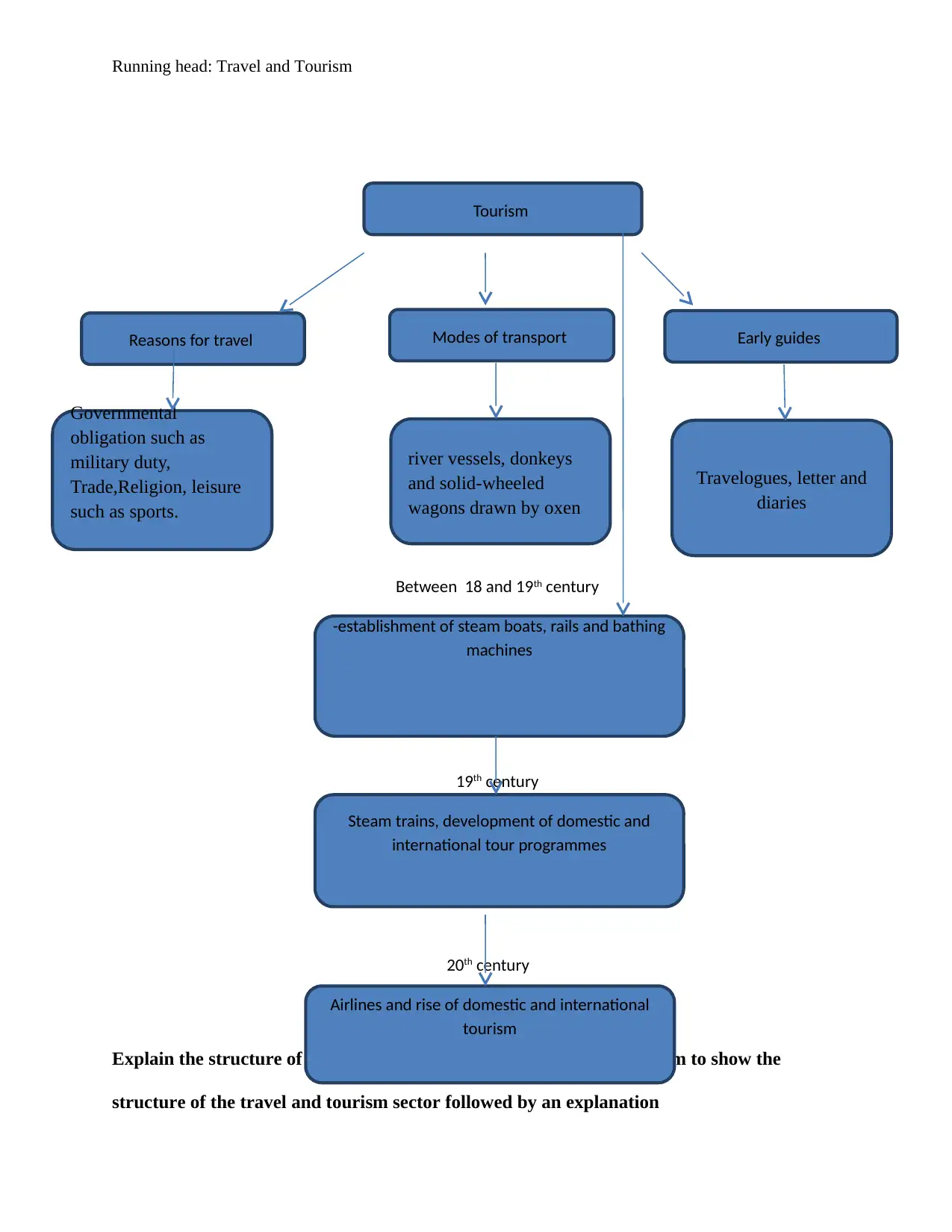
Running head: Travel and Tourism
Explain the structure of the travel and tourism sector. Create a diagram to show the
structure of the travel and tourism sector followed by an explanation
Tourism
Early guidesModes of transportReasons for travel
Governmental
obligation such as
military duty,
Trade,Religion, leisure
such as sports.
Travelogues, letter and
diaries
river vessels, donkeys
and solid-wheeled
wagons drawn by oxen
Between 18 and 19th century
-establishment of steam boats, rails and bathing
machines
19th century
Steam trains, development of domestic and
international tour programmes
20th century
Airlines and rise of domestic and international
tourism
Explain the structure of the travel and tourism sector. Create a diagram to show the
structure of the travel and tourism sector followed by an explanation
Tourism
Early guidesModes of transportReasons for travel
Governmental
obligation such as
military duty,
Trade,Religion, leisure
such as sports.
Travelogues, letter and
diaries
river vessels, donkeys
and solid-wheeled
wagons drawn by oxen
Between 18 and 19th century
-establishment of steam boats, rails and bathing
machines
19th century
Steam trains, development of domestic and
international tour programmes
20th century
Airlines and rise of domestic and international
tourism
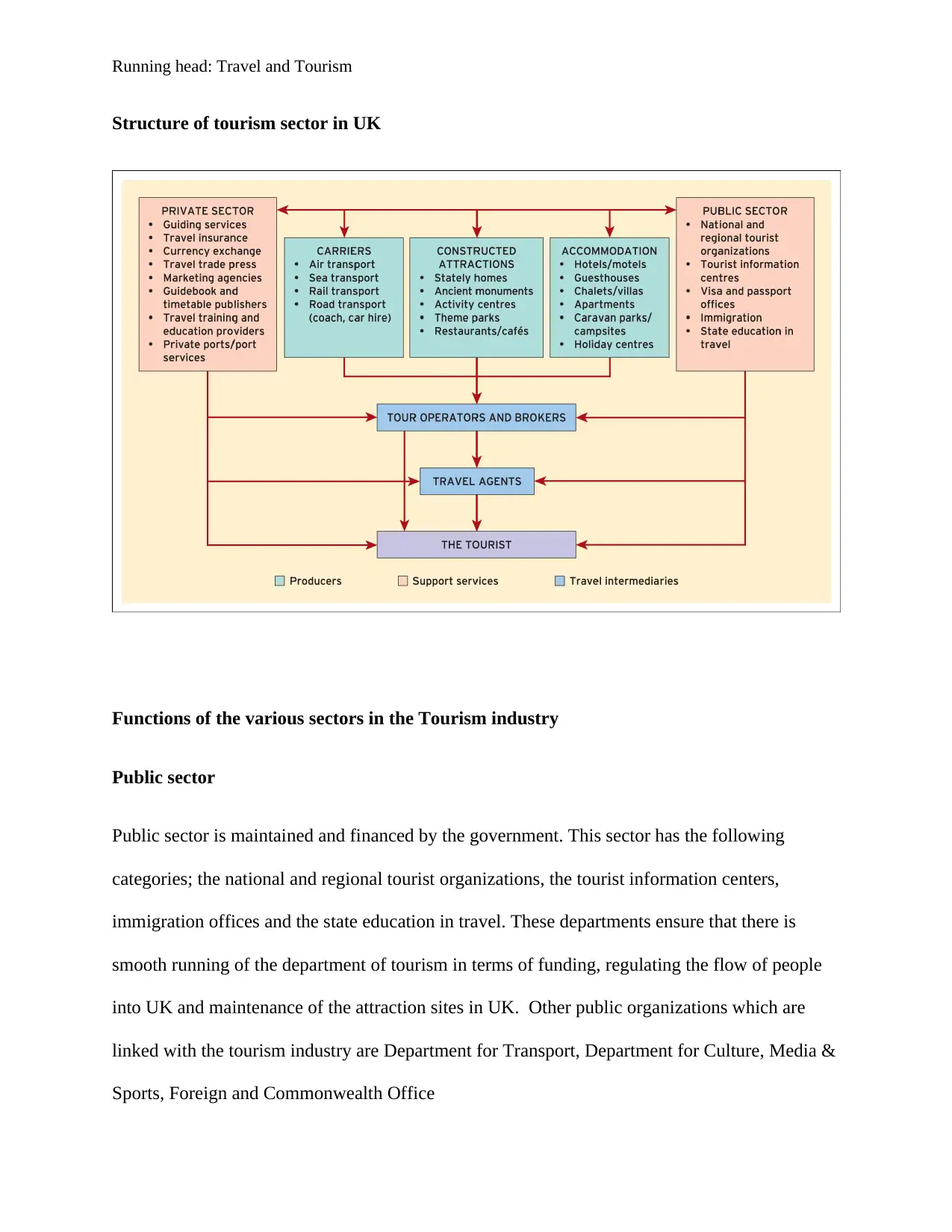
Running head: Travel and Tourism
Structure of tourism sector in UK
Functions of the various sectors in the Tourism industry
Public sector
Public sector is maintained and financed by the government. This sector has the following
categories; the national and regional tourist organizations, the tourist information centers,
immigration offices and the state education in travel. These departments ensure that there is
smooth running of the department of tourism in terms of funding, regulating the flow of people
into UK and maintenance of the attraction sites in UK. Other public organizations which are
linked with the tourism industry are Department for Transport, Department for Culture, Media &
Sports, Foreign and Commonwealth Office
Structure of tourism sector in UK
Functions of the various sectors in the Tourism industry
Public sector
Public sector is maintained and financed by the government. This sector has the following
categories; the national and regional tourist organizations, the tourist information centers,
immigration offices and the state education in travel. These departments ensure that there is
smooth running of the department of tourism in terms of funding, regulating the flow of people
into UK and maintenance of the attraction sites in UK. Other public organizations which are
linked with the tourism industry are Department for Transport, Department for Culture, Media &
Sports, Foreign and Commonwealth Office
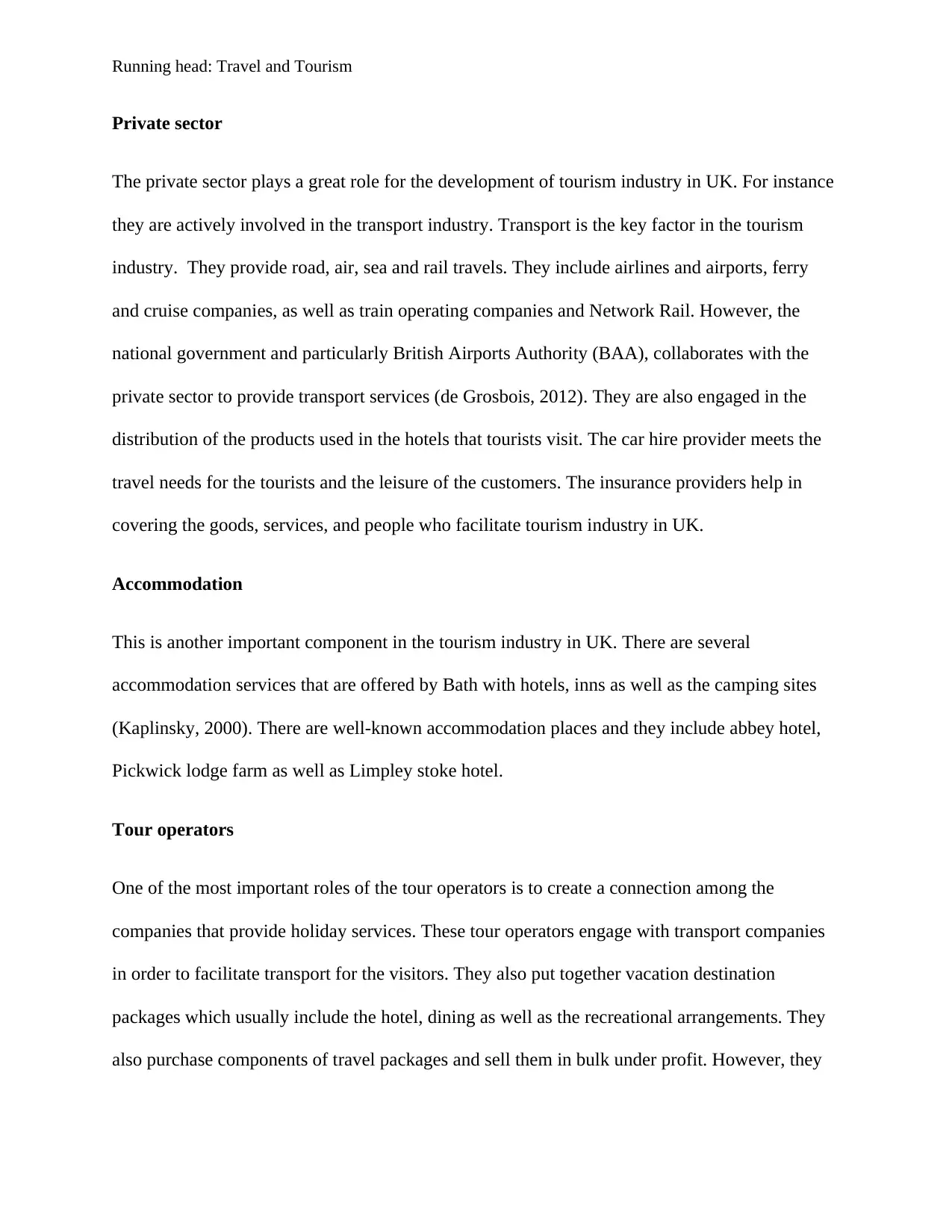
Running head: Travel and Tourism
Private sector
The private sector plays a great role for the development of tourism industry in UK. For instance
they are actively involved in the transport industry. Transport is the key factor in the tourism
industry. They provide road, air, sea and rail travels. They include airlines and airports, ferry
and cruise companies, as well as train operating companies and Network Rail. However, the
national government and particularly British Airports Authority (BAA), collaborates with the
private sector to provide transport services (de Grosbois, 2012). They are also engaged in the
distribution of the products used in the hotels that tourists visit. The car hire provider meets the
travel needs for the tourists and the leisure of the customers. The insurance providers help in
covering the goods, services, and people who facilitate tourism industry in UK.
Accommodation
This is another important component in the tourism industry in UK. There are several
accommodation services that are offered by Bath with hotels, inns as well as the camping sites
(Kaplinsky, 2000). There are well-known accommodation places and they include abbey hotel,
Pickwick lodge farm as well as Limpley stoke hotel.
Tour operators
One of the most important roles of the tour operators is to create a connection among the
companies that provide holiday services. These tour operators engage with transport companies
in order to facilitate transport for the visitors. They also put together vacation destination
packages which usually include the hotel, dining as well as the recreational arrangements. They
also purchase components of travel packages and sell them in bulk under profit. However, they
Private sector
The private sector plays a great role for the development of tourism industry in UK. For instance
they are actively involved in the transport industry. Transport is the key factor in the tourism
industry. They provide road, air, sea and rail travels. They include airlines and airports, ferry
and cruise companies, as well as train operating companies and Network Rail. However, the
national government and particularly British Airports Authority (BAA), collaborates with the
private sector to provide transport services (de Grosbois, 2012). They are also engaged in the
distribution of the products used in the hotels that tourists visit. The car hire provider meets the
travel needs for the tourists and the leisure of the customers. The insurance providers help in
covering the goods, services, and people who facilitate tourism industry in UK.
Accommodation
This is another important component in the tourism industry in UK. There are several
accommodation services that are offered by Bath with hotels, inns as well as the camping sites
(Kaplinsky, 2000). There are well-known accommodation places and they include abbey hotel,
Pickwick lodge farm as well as Limpley stoke hotel.
Tour operators
One of the most important roles of the tour operators is to create a connection among the
companies that provide holiday services. These tour operators engage with transport companies
in order to facilitate transport for the visitors. They also put together vacation destination
packages which usually include the hotel, dining as well as the recreational arrangements. They
also purchase components of travel packages and sell them in bulk under profit. However, they
Paraphrase This Document
Need a fresh take? Get an instant paraphrase of this document with our AI Paraphraser
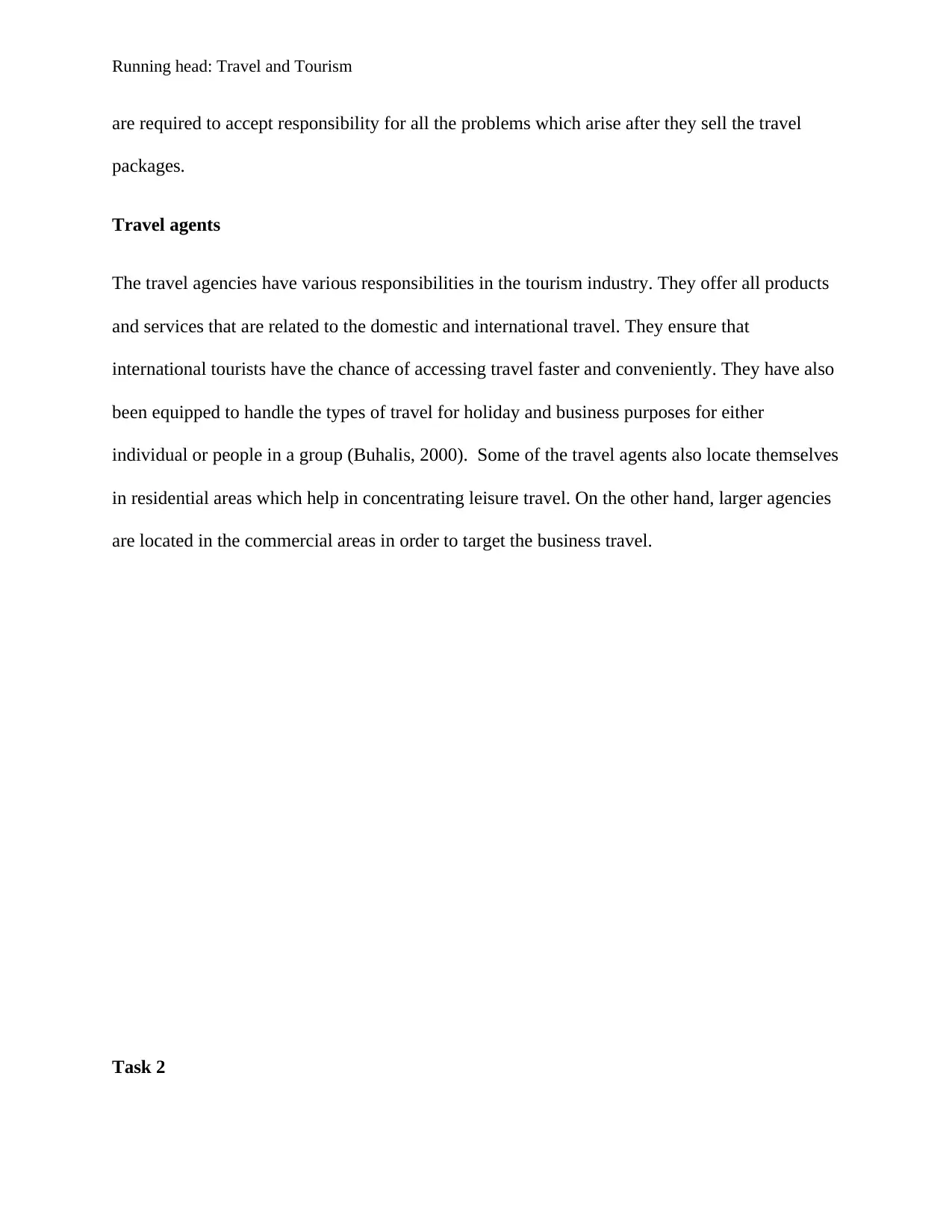
Running head: Travel and Tourism
are required to accept responsibility for all the problems which arise after they sell the travel
packages.
Travel agents
The travel agencies have various responsibilities in the tourism industry. They offer all products
and services that are related to the domestic and international travel. They ensure that
international tourists have the chance of accessing travel faster and conveniently. They have also
been equipped to handle the types of travel for holiday and business purposes for either
individual or people in a group (Buhalis, 2000). Some of the travel agents also locate themselves
in residential areas which help in concentrating leisure travel. On the other hand, larger agencies
are located in the commercial areas in order to target the business travel.
Task 2
are required to accept responsibility for all the problems which arise after they sell the travel
packages.
Travel agents
The travel agencies have various responsibilities in the tourism industry. They offer all products
and services that are related to the domestic and international travel. They ensure that
international tourists have the chance of accessing travel faster and conveniently. They have also
been equipped to handle the types of travel for holiday and business purposes for either
individual or people in a group (Buhalis, 2000). Some of the travel agents also locate themselves
in residential areas which help in concentrating leisure travel. On the other hand, larger agencies
are located in the commercial areas in order to target the business travel.
Task 2
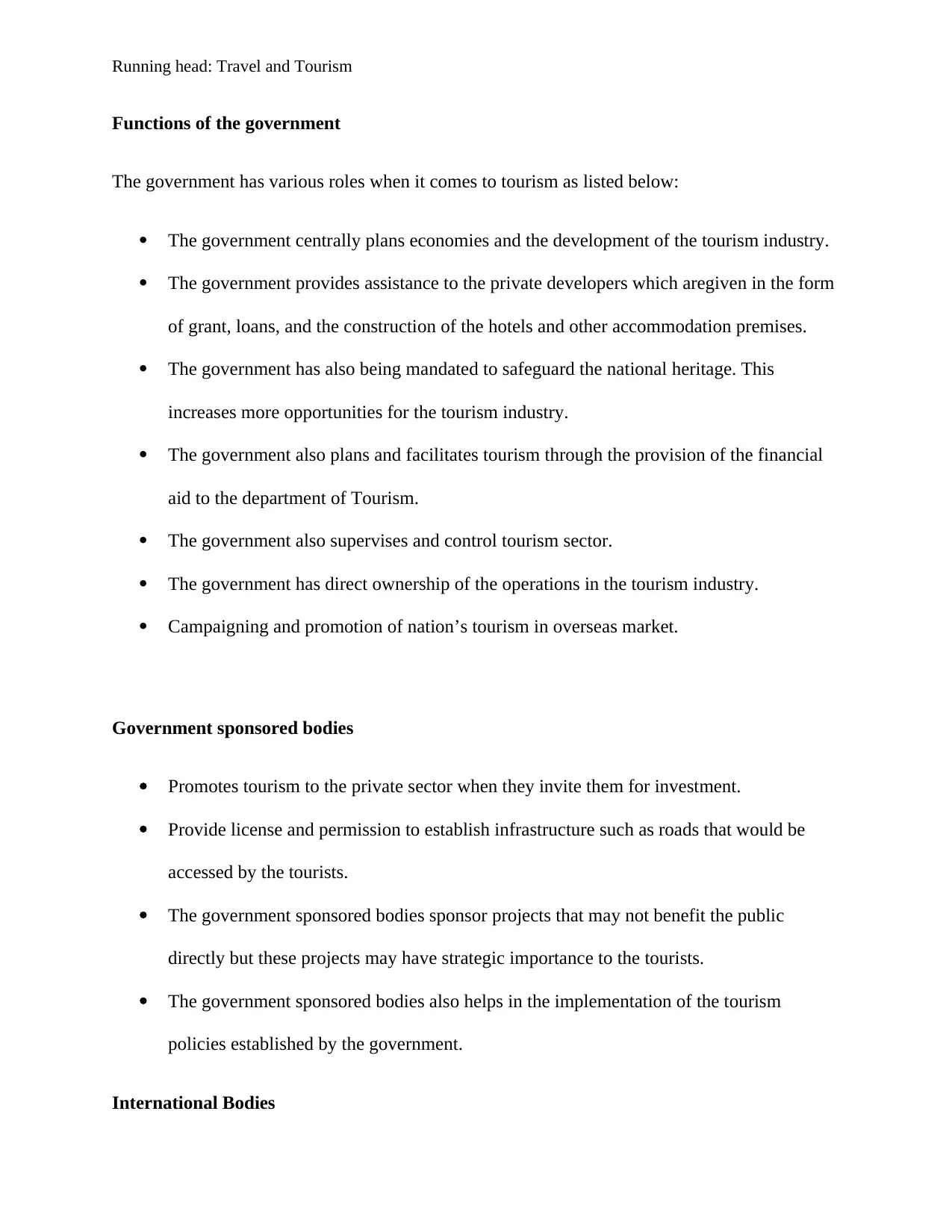
Running head: Travel and Tourism
Functions of the government
The government has various roles when it comes to tourism as listed below:
The government centrally plans economies and the development of the tourism industry.
The government provides assistance to the private developers which aregiven in the form
of grant, loans, and the construction of the hotels and other accommodation premises.
The government has also being mandated to safeguard the national heritage. This
increases more opportunities for the tourism industry.
The government also plans and facilitates tourism through the provision of the financial
aid to the department of Tourism.
The government also supervises and control tourism sector.
The government has direct ownership of the operations in the tourism industry.
Campaigning and promotion of nation’s tourism in overseas market.
Government sponsored bodies
Promotes tourism to the private sector when they invite them for investment.
Provide license and permission to establish infrastructure such as roads that would be
accessed by the tourists.
The government sponsored bodies sponsor projects that may not benefit the public
directly but these projects may have strategic importance to the tourists.
The government sponsored bodies also helps in the implementation of the tourism
policies established by the government.
International Bodies
Functions of the government
The government has various roles when it comes to tourism as listed below:
The government centrally plans economies and the development of the tourism industry.
The government provides assistance to the private developers which aregiven in the form
of grant, loans, and the construction of the hotels and other accommodation premises.
The government has also being mandated to safeguard the national heritage. This
increases more opportunities for the tourism industry.
The government also plans and facilitates tourism through the provision of the financial
aid to the department of Tourism.
The government also supervises and control tourism sector.
The government has direct ownership of the operations in the tourism industry.
Campaigning and promotion of nation’s tourism in overseas market.
Government sponsored bodies
Promotes tourism to the private sector when they invite them for investment.
Provide license and permission to establish infrastructure such as roads that would be
accessed by the tourists.
The government sponsored bodies sponsor projects that may not benefit the public
directly but these projects may have strategic importance to the tourists.
The government sponsored bodies also helps in the implementation of the tourism
policies established by the government.
International Bodies
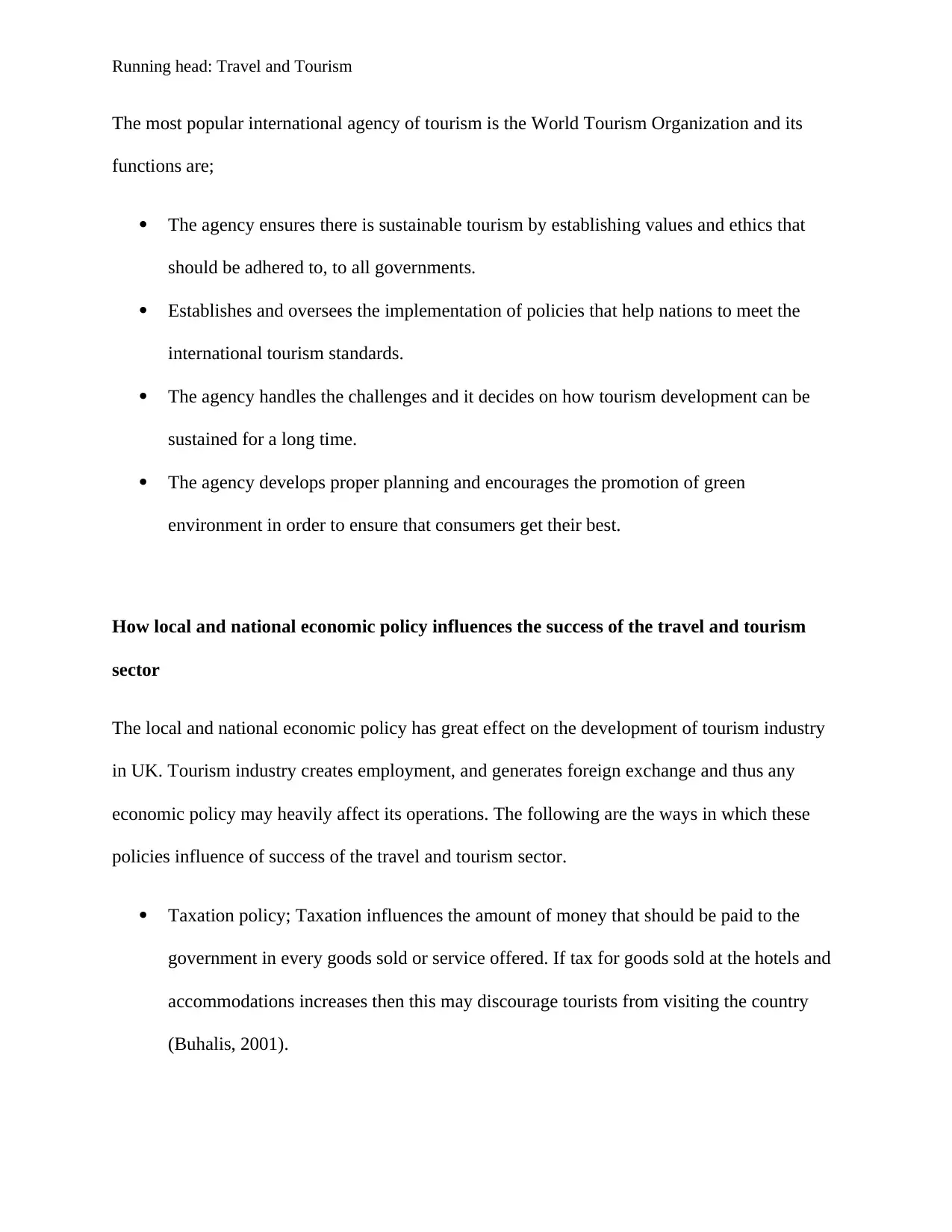
Running head: Travel and Tourism
The most popular international agency of tourism is the World Tourism Organization and its
functions are;
The agency ensures there is sustainable tourism by establishing values and ethics that
should be adhered to, to all governments.
Establishes and oversees the implementation of policies that help nations to meet the
international tourism standards.
The agency handles the challenges and it decides on how tourism development can be
sustained for a long time.
The agency develops proper planning and encourages the promotion of green
environment in order to ensure that consumers get their best.
How local and national economic policy influences the success of the travel and tourism
sector
The local and national economic policy has great effect on the development of tourism industry
in UK. Tourism industry creates employment, and generates foreign exchange and thus any
economic policy may heavily affect its operations. The following are the ways in which these
policies influence of success of the travel and tourism sector.
Taxation policy; Taxation influences the amount of money that should be paid to the
government in every goods sold or service offered. If tax for goods sold at the hotels and
accommodations increases then this may discourage tourists from visiting the country
(Buhalis, 2001).
The most popular international agency of tourism is the World Tourism Organization and its
functions are;
The agency ensures there is sustainable tourism by establishing values and ethics that
should be adhered to, to all governments.
Establishes and oversees the implementation of policies that help nations to meet the
international tourism standards.
The agency handles the challenges and it decides on how tourism development can be
sustained for a long time.
The agency develops proper planning and encourages the promotion of green
environment in order to ensure that consumers get their best.
How local and national economic policy influences the success of the travel and tourism
sector
The local and national economic policy has great effect on the development of tourism industry
in UK. Tourism industry creates employment, and generates foreign exchange and thus any
economic policy may heavily affect its operations. The following are the ways in which these
policies influence of success of the travel and tourism sector.
Taxation policy; Taxation influences the amount of money that should be paid to the
government in every goods sold or service offered. If tax for goods sold at the hotels and
accommodations increases then this may discourage tourists from visiting the country
(Buhalis, 2001).
Secure Best Marks with AI Grader
Need help grading? Try our AI Grader for instant feedback on your assignments.
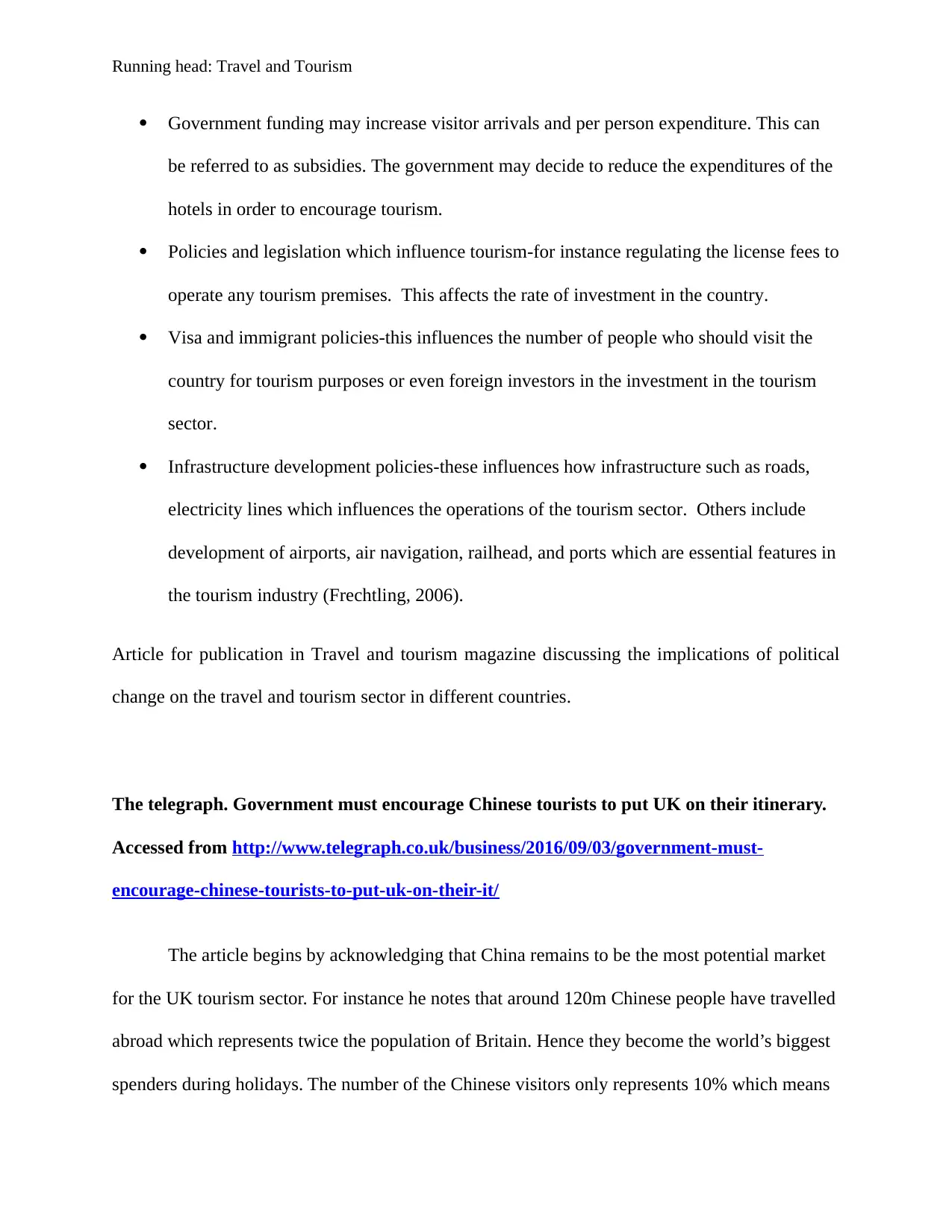
Running head: Travel and Tourism
Government funding may increase visitor arrivals and per person expenditure. This can
be referred to as subsidies. The government may decide to reduce the expenditures of the
hotels in order to encourage tourism.
Policies and legislation which influence tourism-for instance regulating the license fees to
operate any tourism premises. This affects the rate of investment in the country.
Visa and immigrant policies-this influences the number of people who should visit the
country for tourism purposes or even foreign investors in the investment in the tourism
sector.
Infrastructure development policies-these influences how infrastructure such as roads,
electricity lines which influences the operations of the tourism sector. Others include
development of airports, air navigation, railhead, and ports which are essential features in
the tourism industry (Frechtling, 2006).
Article for publication in Travel and tourism magazine discussing the implications of political
change on the travel and tourism sector in different countries.
The telegraph. Government must encourage Chinese tourists to put UK on their itinerary.
Accessed from http://www.telegraph.co.uk/business/2016/09/03/government-must-
encourage-chinese-tourists-to-put-uk-on-their-it/
The article begins by acknowledging that China remains to be the most potential market
for the UK tourism sector. For instance he notes that around 120m Chinese people have travelled
abroad which represents twice the population of Britain. Hence they become the world’s biggest
spenders during holidays. The number of the Chinese visitors only represents 10% which means
Government funding may increase visitor arrivals and per person expenditure. This can
be referred to as subsidies. The government may decide to reduce the expenditures of the
hotels in order to encourage tourism.
Policies and legislation which influence tourism-for instance regulating the license fees to
operate any tourism premises. This affects the rate of investment in the country.
Visa and immigrant policies-this influences the number of people who should visit the
country for tourism purposes or even foreign investors in the investment in the tourism
sector.
Infrastructure development policies-these influences how infrastructure such as roads,
electricity lines which influences the operations of the tourism sector. Others include
development of airports, air navigation, railhead, and ports which are essential features in
the tourism industry (Frechtling, 2006).
Article for publication in Travel and tourism magazine discussing the implications of political
change on the travel and tourism sector in different countries.
The telegraph. Government must encourage Chinese tourists to put UK on their itinerary.
Accessed from http://www.telegraph.co.uk/business/2016/09/03/government-must-
encourage-chinese-tourists-to-put-uk-on-their-it/
The article begins by acknowledging that China remains to be the most potential market
for the UK tourism sector. For instance he notes that around 120m Chinese people have travelled
abroad which represents twice the population of Britain. Hence they become the world’s biggest
spenders during holidays. The number of the Chinese visitors only represents 10% which means
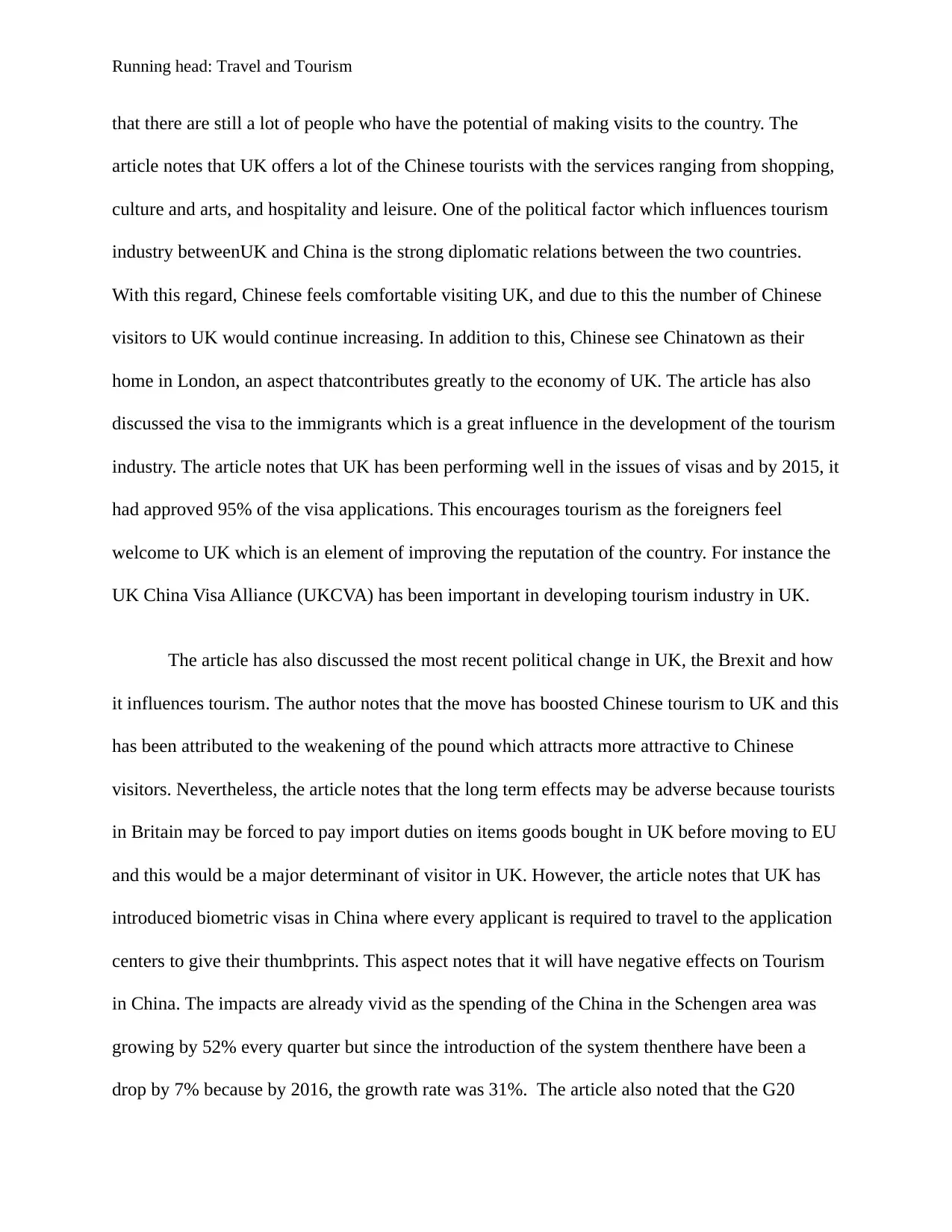
Running head: Travel and Tourism
that there are still a lot of people who have the potential of making visits to the country. The
article notes that UK offers a lot of the Chinese tourists with the services ranging from shopping,
culture and arts, and hospitality and leisure. One of the political factor which influences tourism
industry betweenUK and China is the strong diplomatic relations between the two countries.
With this regard, Chinese feels comfortable visiting UK, and due to this the number of Chinese
visitors to UK would continue increasing. In addition to this, Chinese see Chinatown as their
home in London, an aspect thatcontributes greatly to the economy of UK. The article has also
discussed the visa to the immigrants which is a great influence in the development of the tourism
industry. The article notes that UK has been performing well in the issues of visas and by 2015, it
had approved 95% of the visa applications. This encourages tourism as the foreigners feel
welcome to UK which is an element of improving the reputation of the country. For instance the
UK China Visa Alliance (UKCVA) has been important in developing tourism industry in UK.
The article has also discussed the most recent political change in UK, the Brexit and how
it influences tourism. The author notes that the move has boosted Chinese tourism to UK and this
has been attributed to the weakening of the pound which attracts more attractive to Chinese
visitors. Nevertheless, the article notes that the long term effects may be adverse because tourists
in Britain may be forced to pay import duties on items goods bought in UK before moving to EU
and this would be a major determinant of visitor in UK. However, the article notes that UK has
introduced biometric visas in China where every applicant is required to travel to the application
centers to give their thumbprints. This aspect notes that it will have negative effects on Tourism
in China. The impacts are already vivid as the spending of the China in the Schengen area was
growing by 52% every quarter but since the introduction of the system thenthere have been a
drop by 7% because by 2016, the growth rate was 31%. The article also noted that the G20
that there are still a lot of people who have the potential of making visits to the country. The
article notes that UK offers a lot of the Chinese tourists with the services ranging from shopping,
culture and arts, and hospitality and leisure. One of the political factor which influences tourism
industry betweenUK and China is the strong diplomatic relations between the two countries.
With this regard, Chinese feels comfortable visiting UK, and due to this the number of Chinese
visitors to UK would continue increasing. In addition to this, Chinese see Chinatown as their
home in London, an aspect thatcontributes greatly to the economy of UK. The article has also
discussed the visa to the immigrants which is a great influence in the development of the tourism
industry. The article notes that UK has been performing well in the issues of visas and by 2015, it
had approved 95% of the visa applications. This encourages tourism as the foreigners feel
welcome to UK which is an element of improving the reputation of the country. For instance the
UK China Visa Alliance (UKCVA) has been important in developing tourism industry in UK.
The article has also discussed the most recent political change in UK, the Brexit and how
it influences tourism. The author notes that the move has boosted Chinese tourism to UK and this
has been attributed to the weakening of the pound which attracts more attractive to Chinese
visitors. Nevertheless, the article notes that the long term effects may be adverse because tourists
in Britain may be forced to pay import duties on items goods bought in UK before moving to EU
and this would be a major determinant of visitor in UK. However, the article notes that UK has
introduced biometric visas in China where every applicant is required to travel to the application
centers to give their thumbprints. This aspect notes that it will have negative effects on Tourism
in China. The impacts are already vivid as the spending of the China in the Schengen area was
growing by 52% every quarter but since the introduction of the system thenthere have been a
drop by 7% because by 2016, the growth rate was 31%. The article also noted that the G20
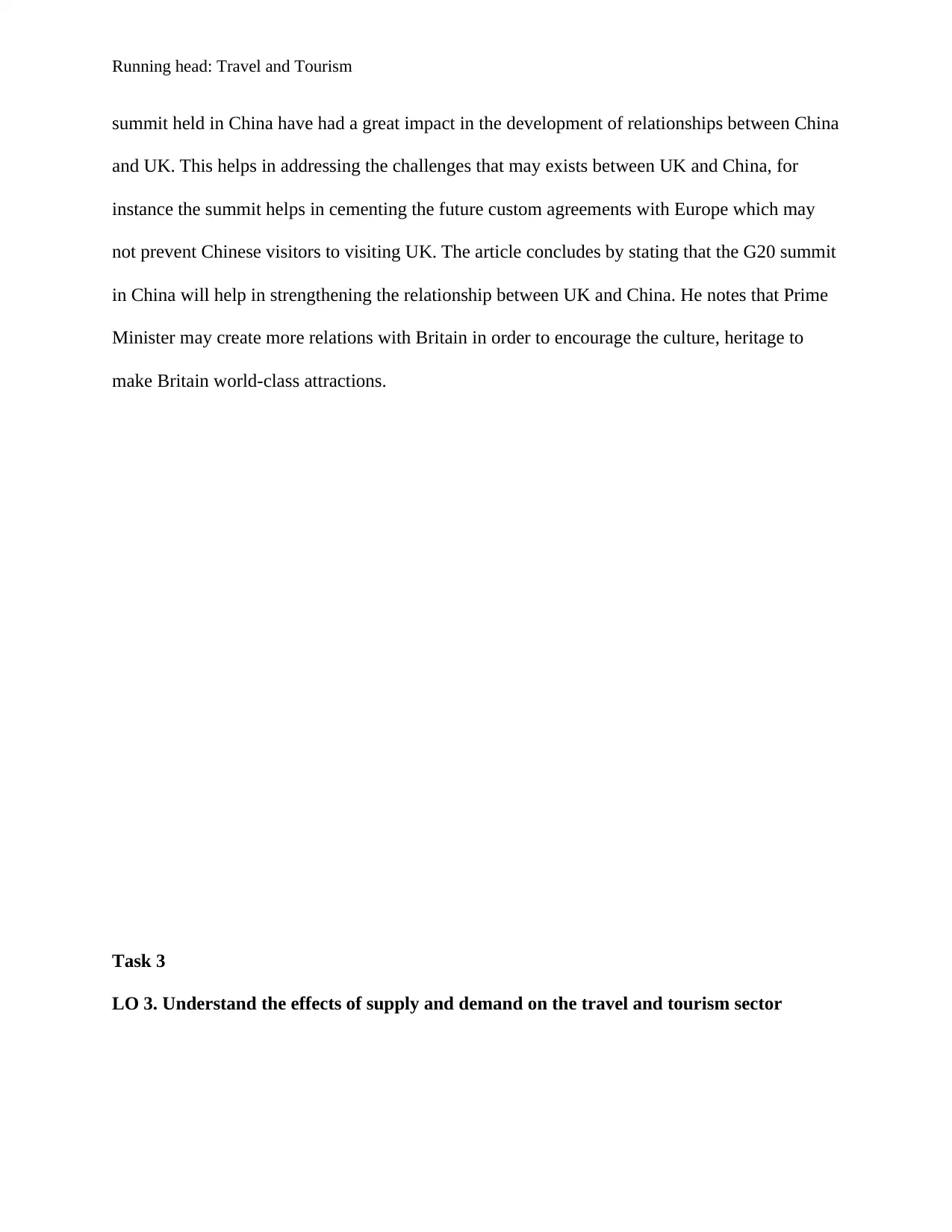
Running head: Travel and Tourism
summit held in China have had a great impact in the development of relationships between China
and UK. This helps in addressing the challenges that may exists between UK and China, for
instance the summit helps in cementing the future custom agreements with Europe which may
not prevent Chinese visitors to visiting UK. The article concludes by stating that the G20 summit
in China will help in strengthening the relationship between UK and China. He notes that Prime
Minister may create more relations with Britain in order to encourage the culture, heritage to
make Britain world-class attractions.
Task 3
LO 3. Understand the effects of supply and demand on the travel and tourism sector
summit held in China have had a great impact in the development of relationships between China
and UK. This helps in addressing the challenges that may exists between UK and China, for
instance the summit helps in cementing the future custom agreements with Europe which may
not prevent Chinese visitors to visiting UK. The article concludes by stating that the G20 summit
in China will help in strengthening the relationship between UK and China. He notes that Prime
Minister may create more relations with Britain in order to encourage the culture, heritage to
make Britain world-class attractions.
Task 3
LO 3. Understand the effects of supply and demand on the travel and tourism sector
Paraphrase This Document
Need a fresh take? Get an instant paraphrase of this document with our AI Paraphraser
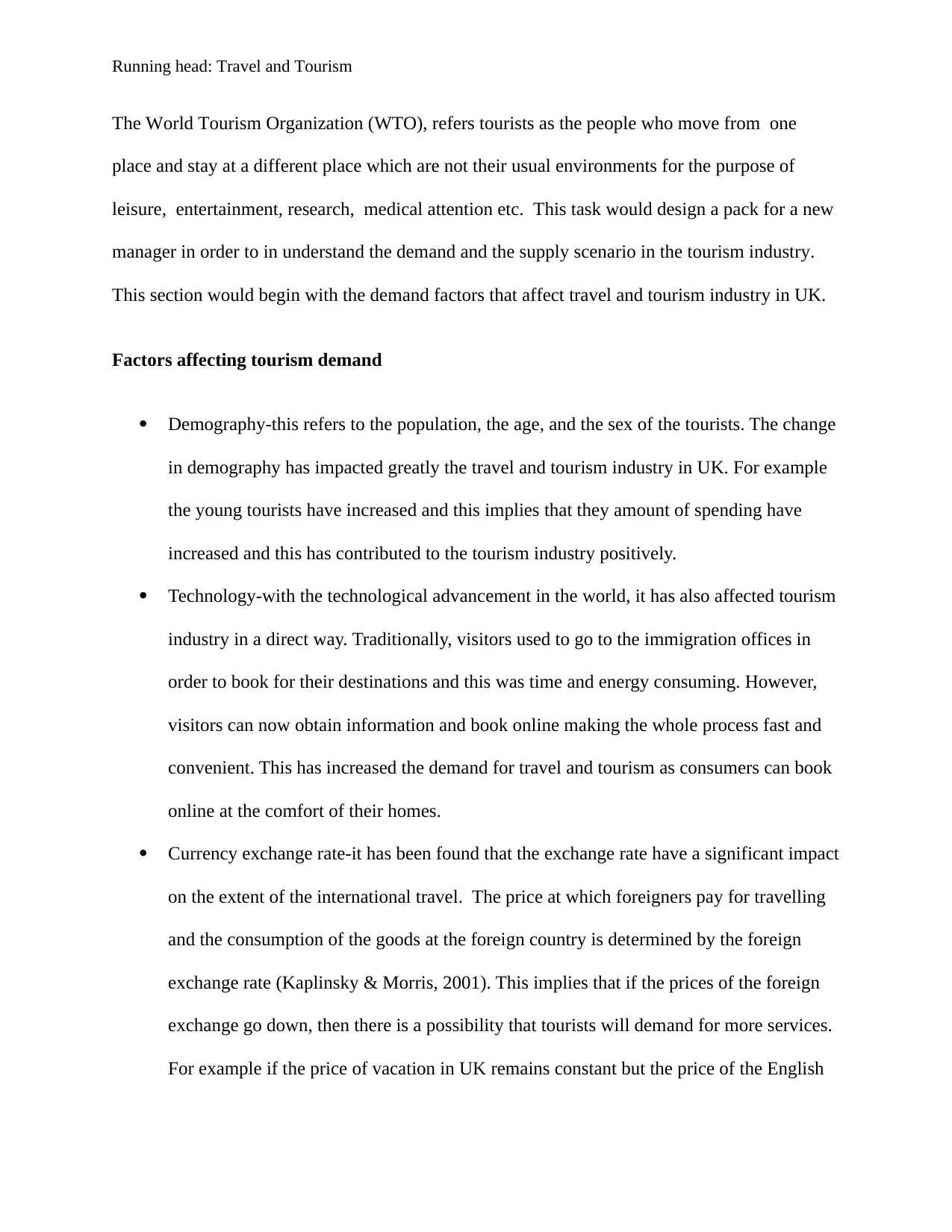
Running head: Travel and Tourism
The World Tourism Organization (WTO), refers tourists as the people who move from one
place and stay at a different place which are not their usual environments for the purpose of
leisure, entertainment, research, medical attention etc. This task would design a pack for a new
manager in order to in understand the demand and the supply scenario in the tourism industry.
This section would begin with the demand factors that affect travel and tourism industry in UK.
Factors affecting tourism demand
Demography-this refers to the population, the age, and the sex of the tourists. The change
in demography has impacted greatly the travel and tourism industry in UK. For example
the young tourists have increased and this implies that they amount of spending have
increased and this has contributed to the tourism industry positively.
Technology-with the technological advancement in the world, it has also affected tourism
industry in a direct way. Traditionally, visitors used to go to the immigration offices in
order to book for their destinations and this was time and energy consuming. However,
visitors can now obtain information and book online making the whole process fast and
convenient. This has increased the demand for travel and tourism as consumers can book
online at the comfort of their homes.
Currency exchange rate-it has been found that the exchange rate have a significant impact
on the extent of the international travel. The price at which foreigners pay for travelling
and the consumption of the goods at the foreign country is determined by the foreign
exchange rate (Kaplinsky & Morris, 2001). This implies that if the prices of the foreign
exchange go down, then there is a possibility that tourists will demand for more services.
For example if the price of vacation in UK remains constant but the price of the English
The World Tourism Organization (WTO), refers tourists as the people who move from one
place and stay at a different place which are not their usual environments for the purpose of
leisure, entertainment, research, medical attention etc. This task would design a pack for a new
manager in order to in understand the demand and the supply scenario in the tourism industry.
This section would begin with the demand factors that affect travel and tourism industry in UK.
Factors affecting tourism demand
Demography-this refers to the population, the age, and the sex of the tourists. The change
in demography has impacted greatly the travel and tourism industry in UK. For example
the young tourists have increased and this implies that they amount of spending have
increased and this has contributed to the tourism industry positively.
Technology-with the technological advancement in the world, it has also affected tourism
industry in a direct way. Traditionally, visitors used to go to the immigration offices in
order to book for their destinations and this was time and energy consuming. However,
visitors can now obtain information and book online making the whole process fast and
convenient. This has increased the demand for travel and tourism as consumers can book
online at the comfort of their homes.
Currency exchange rate-it has been found that the exchange rate have a significant impact
on the extent of the international travel. The price at which foreigners pay for travelling
and the consumption of the goods at the foreign country is determined by the foreign
exchange rate (Kaplinsky & Morris, 2001). This implies that if the prices of the foreign
exchange go down, then there is a possibility that tourists will demand for more services.
For example if the price of vacation in UK remains constant but the price of the English
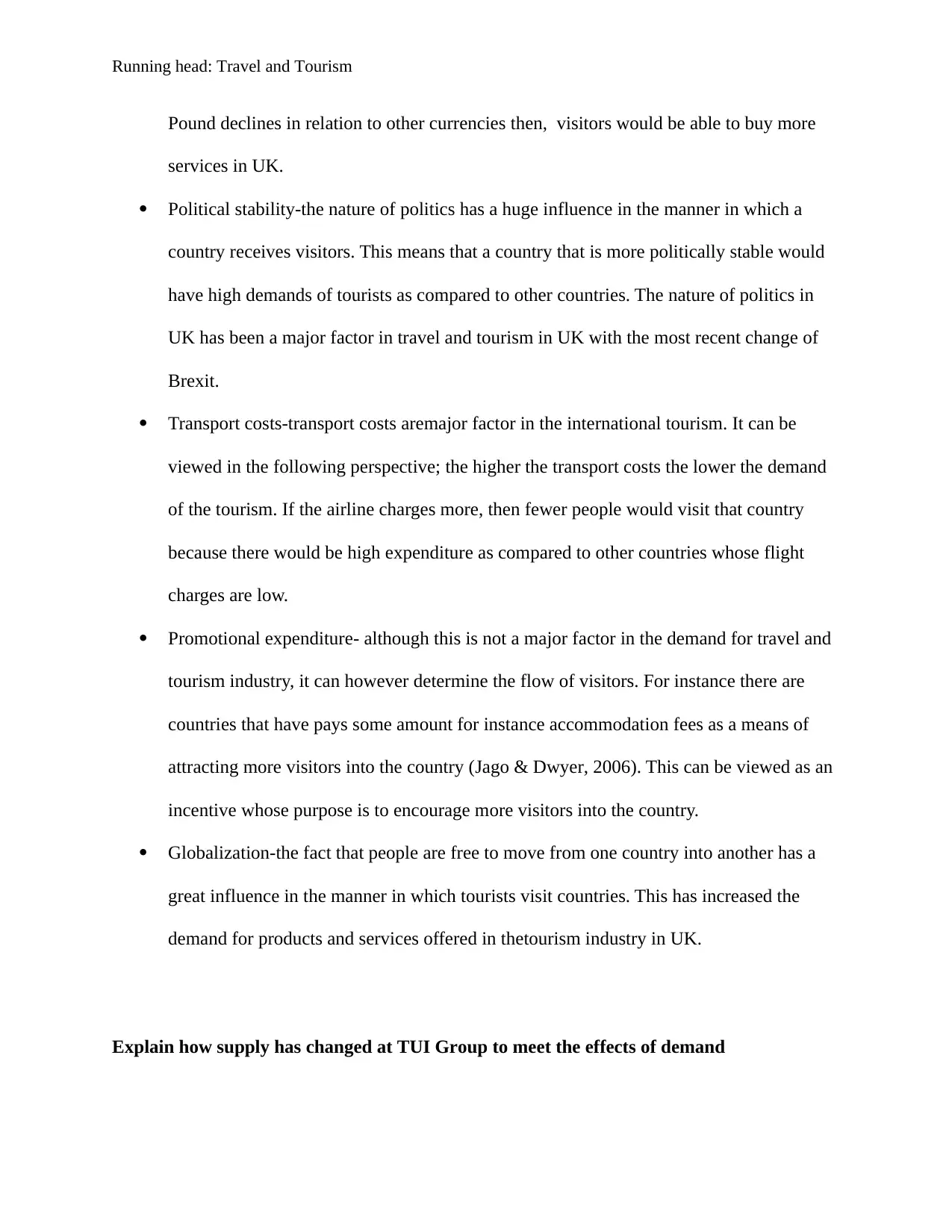
Running head: Travel and Tourism
Pound declines in relation to other currencies then, visitors would be able to buy more
services in UK.
Political stability-the nature of politics has a huge influence in the manner in which a
country receives visitors. This means that a country that is more politically stable would
have high demands of tourists as compared to other countries. The nature of politics in
UK has been a major factor in travel and tourism in UK with the most recent change of
Brexit.
Transport costs-transport costs aremajor factor in the international tourism. It can be
viewed in the following perspective; the higher the transport costs the lower the demand
of the tourism. If the airline charges more, then fewer people would visit that country
because there would be high expenditure as compared to other countries whose flight
charges are low.
Promotional expenditure- although this is not a major factor in the demand for travel and
tourism industry, it can however determine the flow of visitors. For instance there are
countries that have pays some amount for instance accommodation fees as a means of
attracting more visitors into the country (Jago & Dwyer, 2006). This can be viewed as an
incentive whose purpose is to encourage more visitors into the country.
Globalization-the fact that people are free to move from one country into another has a
great influence in the manner in which tourists visit countries. This has increased the
demand for products and services offered in thetourism industry in UK.
Explain how supply has changed at TUI Group to meet the effects of demand
Pound declines in relation to other currencies then, visitors would be able to buy more
services in UK.
Political stability-the nature of politics has a huge influence in the manner in which a
country receives visitors. This means that a country that is more politically stable would
have high demands of tourists as compared to other countries. The nature of politics in
UK has been a major factor in travel and tourism in UK with the most recent change of
Brexit.
Transport costs-transport costs aremajor factor in the international tourism. It can be
viewed in the following perspective; the higher the transport costs the lower the demand
of the tourism. If the airline charges more, then fewer people would visit that country
because there would be high expenditure as compared to other countries whose flight
charges are low.
Promotional expenditure- although this is not a major factor in the demand for travel and
tourism industry, it can however determine the flow of visitors. For instance there are
countries that have pays some amount for instance accommodation fees as a means of
attracting more visitors into the country (Jago & Dwyer, 2006). This can be viewed as an
incentive whose purpose is to encourage more visitors into the country.
Globalization-the fact that people are free to move from one country into another has a
great influence in the manner in which tourists visit countries. This has increased the
demand for products and services offered in thetourism industry in UK.
Explain how supply has changed at TUI Group to meet the effects of demand
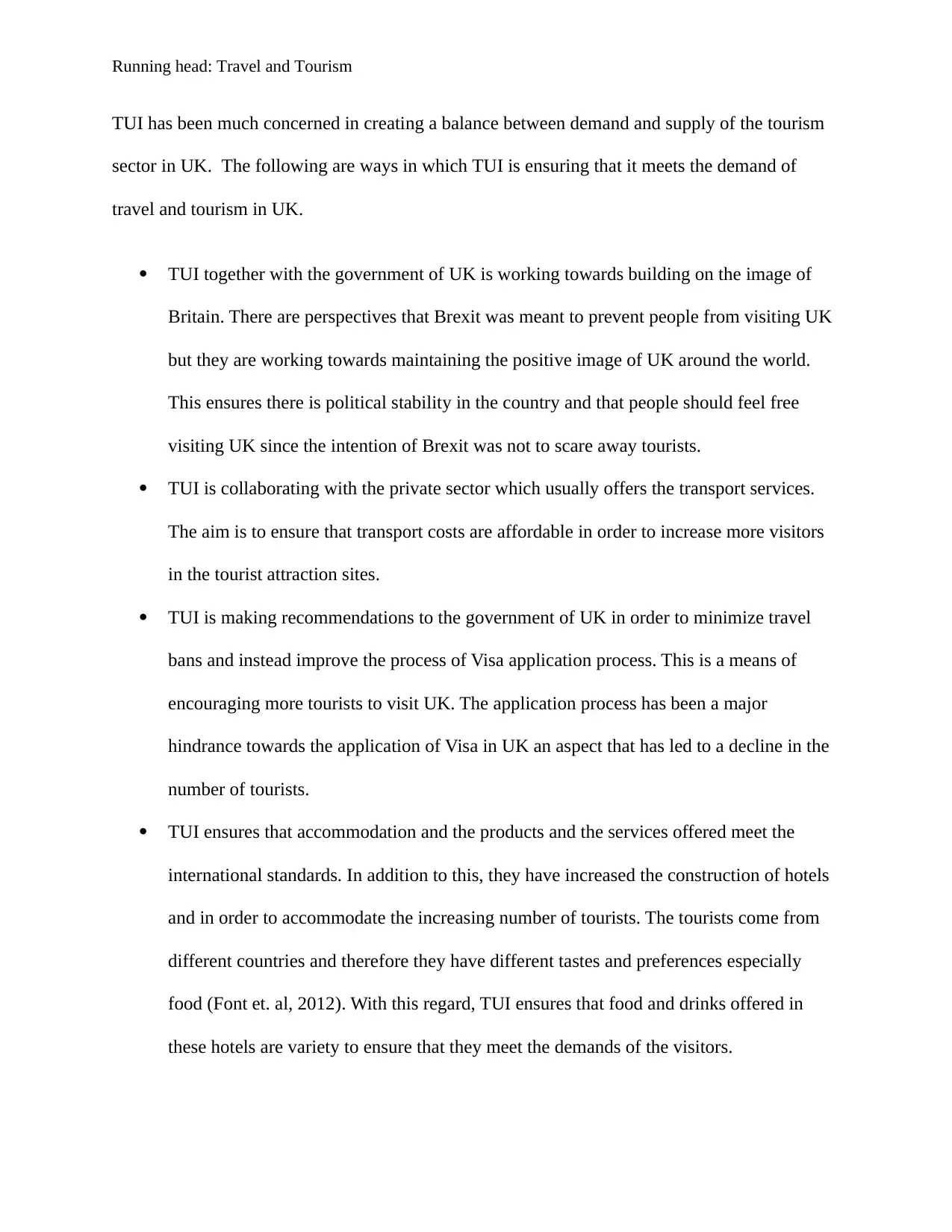
Running head: Travel and Tourism
TUI has been much concerned in creating a balance between demand and supply of the tourism
sector in UK. The following are ways in which TUI is ensuring that it meets the demand of
travel and tourism in UK.
TUI together with the government of UK is working towards building on the image of
Britain. There are perspectives that Brexit was meant to prevent people from visiting UK
but they are working towards maintaining the positive image of UK around the world.
This ensures there is political stability in the country and that people should feel free
visiting UK since the intention of Brexit was not to scare away tourists.
TUI is collaborating with the private sector which usually offers the transport services.
The aim is to ensure that transport costs are affordable in order to increase more visitors
in the tourist attraction sites.
TUI is making recommendations to the government of UK in order to minimize travel
bans and instead improve the process of Visa application process. This is a means of
encouraging more tourists to visit UK. The application process has been a major
hindrance towards the application of Visa in UK an aspect that has led to a decline in the
number of tourists.
TUI ensures that accommodation and the products and the services offered meet the
international standards. In addition to this, they have increased the construction of hotels
and in order to accommodate the increasing number of tourists. The tourists come from
different countries and therefore they have different tastes and preferences especially
food (Font et. al, 2012). With this regard, TUI ensures that food and drinks offered in
these hotels are variety to ensure that they meet the demands of the visitors.
TUI has been much concerned in creating a balance between demand and supply of the tourism
sector in UK. The following are ways in which TUI is ensuring that it meets the demand of
travel and tourism in UK.
TUI together with the government of UK is working towards building on the image of
Britain. There are perspectives that Brexit was meant to prevent people from visiting UK
but they are working towards maintaining the positive image of UK around the world.
This ensures there is political stability in the country and that people should feel free
visiting UK since the intention of Brexit was not to scare away tourists.
TUI is collaborating with the private sector which usually offers the transport services.
The aim is to ensure that transport costs are affordable in order to increase more visitors
in the tourist attraction sites.
TUI is making recommendations to the government of UK in order to minimize travel
bans and instead improve the process of Visa application process. This is a means of
encouraging more tourists to visit UK. The application process has been a major
hindrance towards the application of Visa in UK an aspect that has led to a decline in the
number of tourists.
TUI ensures that accommodation and the products and the services offered meet the
international standards. In addition to this, they have increased the construction of hotels
and in order to accommodate the increasing number of tourists. The tourists come from
different countries and therefore they have different tastes and preferences especially
food (Font et. al, 2012). With this regard, TUI ensures that food and drinks offered in
these hotels are variety to ensure that they meet the demands of the visitors.
Secure Best Marks with AI Grader
Need help grading? Try our AI Grader for instant feedback on your assignments.
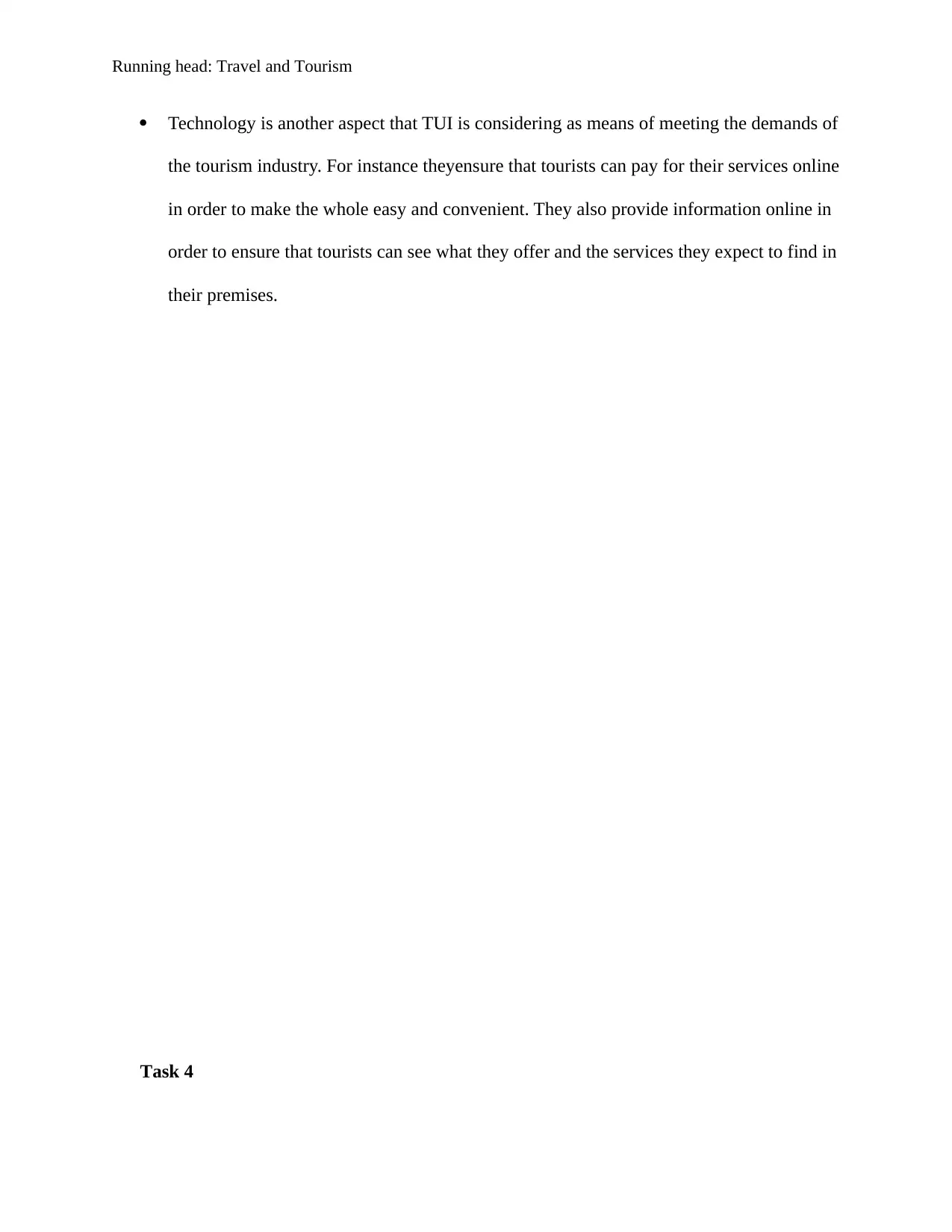
Running head: Travel and Tourism
Technology is another aspect that TUI is considering as means of meeting the demands of
the tourism industry. For instance theyensure that tourists can pay for their services online
in order to make the whole easy and convenient. They also provide information online in
order to ensure that tourists can see what they offer and the services they expect to find in
their premises.
Task 4
Technology is another aspect that TUI is considering as means of meeting the demands of
the tourism industry. For instance theyensure that tourists can pay for their services online
in order to make the whole easy and convenient. They also provide information online in
order to ensure that tourists can see what they offer and the services they expect to find in
their premises.
Task 4
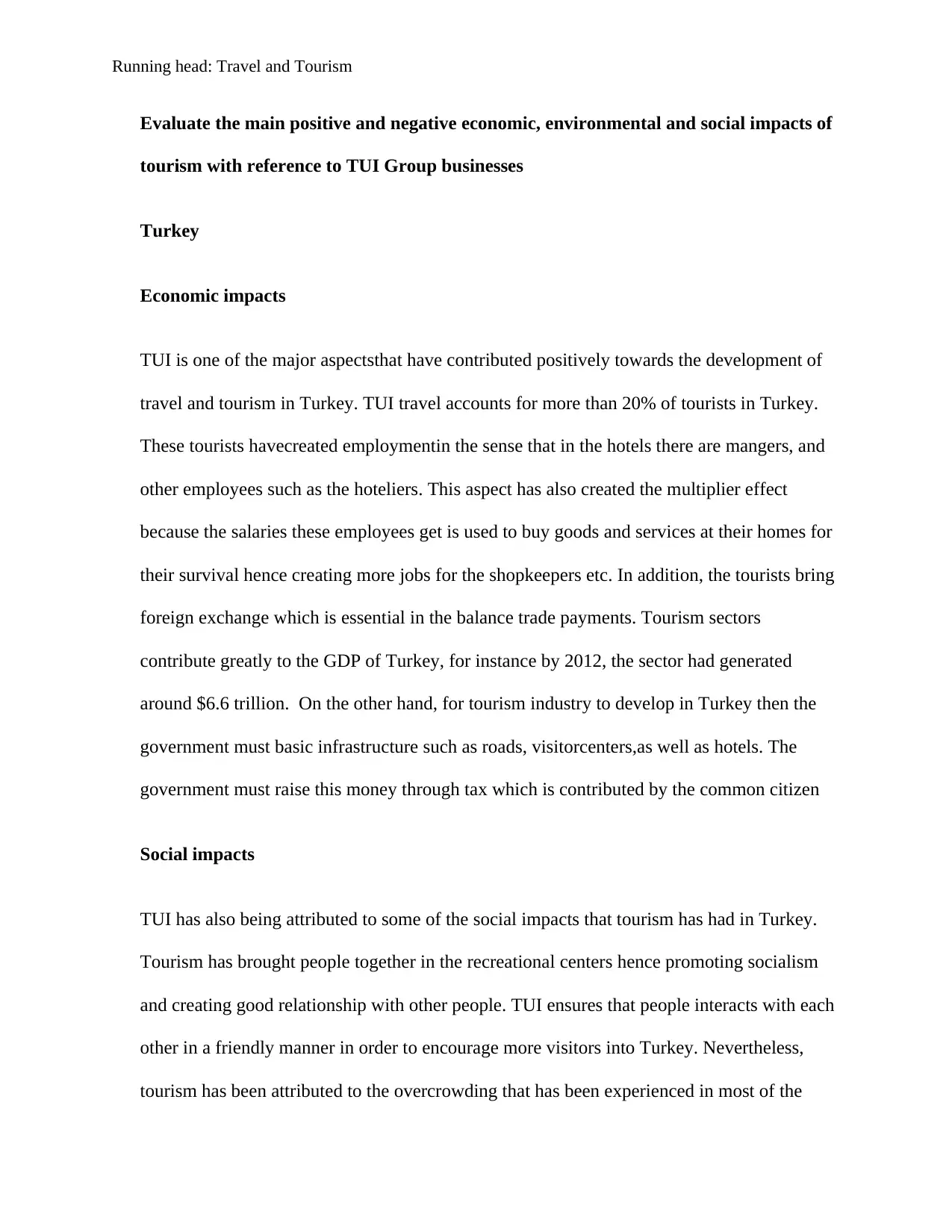
Running head: Travel and Tourism
Evaluate the main positive and negative economic, environmental and social impacts of
tourism with reference to TUI Group businesses
Turkey
Economic impacts
TUI is one of the major aspectsthat have contributed positively towards the development of
travel and tourism in Turkey. TUI travel accounts for more than 20% of tourists in Turkey.
These tourists havecreated employmentin the sense that in the hotels there are mangers, and
other employees such as the hoteliers. This aspect has also created the multiplier effect
because the salaries these employees get is used to buy goods and services at their homes for
their survival hence creating more jobs for the shopkeepers etc. In addition, the tourists bring
foreign exchange which is essential in the balance trade payments. Tourism sectors
contribute greatly to the GDP of Turkey, for instance by 2012, the sector had generated
around $6.6 trillion. On the other hand, for tourism industry to develop in Turkey then the
government must basic infrastructure such as roads, visitorcenters,as well as hotels. The
government must raise this money through tax which is contributed by the common citizen
Social impacts
TUI has also being attributed to some of the social impacts that tourism has had in Turkey.
Tourism has brought people together in the recreational centers hence promoting socialism
and creating good relationship with other people. TUI ensures that people interacts with each
other in a friendly manner in order to encourage more visitors into Turkey. Nevertheless,
tourism has been attributed to the overcrowding that has been experienced in most of the
Evaluate the main positive and negative economic, environmental and social impacts of
tourism with reference to TUI Group businesses
Turkey
Economic impacts
TUI is one of the major aspectsthat have contributed positively towards the development of
travel and tourism in Turkey. TUI travel accounts for more than 20% of tourists in Turkey.
These tourists havecreated employmentin the sense that in the hotels there are mangers, and
other employees such as the hoteliers. This aspect has also created the multiplier effect
because the salaries these employees get is used to buy goods and services at their homes for
their survival hence creating more jobs for the shopkeepers etc. In addition, the tourists bring
foreign exchange which is essential in the balance trade payments. Tourism sectors
contribute greatly to the GDP of Turkey, for instance by 2012, the sector had generated
around $6.6 trillion. On the other hand, for tourism industry to develop in Turkey then the
government must basic infrastructure such as roads, visitorcenters,as well as hotels. The
government must raise this money through tax which is contributed by the common citizen
Social impacts
TUI has also being attributed to some of the social impacts that tourism has had in Turkey.
Tourism has brought people together in the recreational centers hence promoting socialism
and creating good relationship with other people. TUI ensures that people interacts with each
other in a friendly manner in order to encourage more visitors into Turkey. Nevertheless,
tourism has been attributed to the overcrowding that has been experienced in most of the
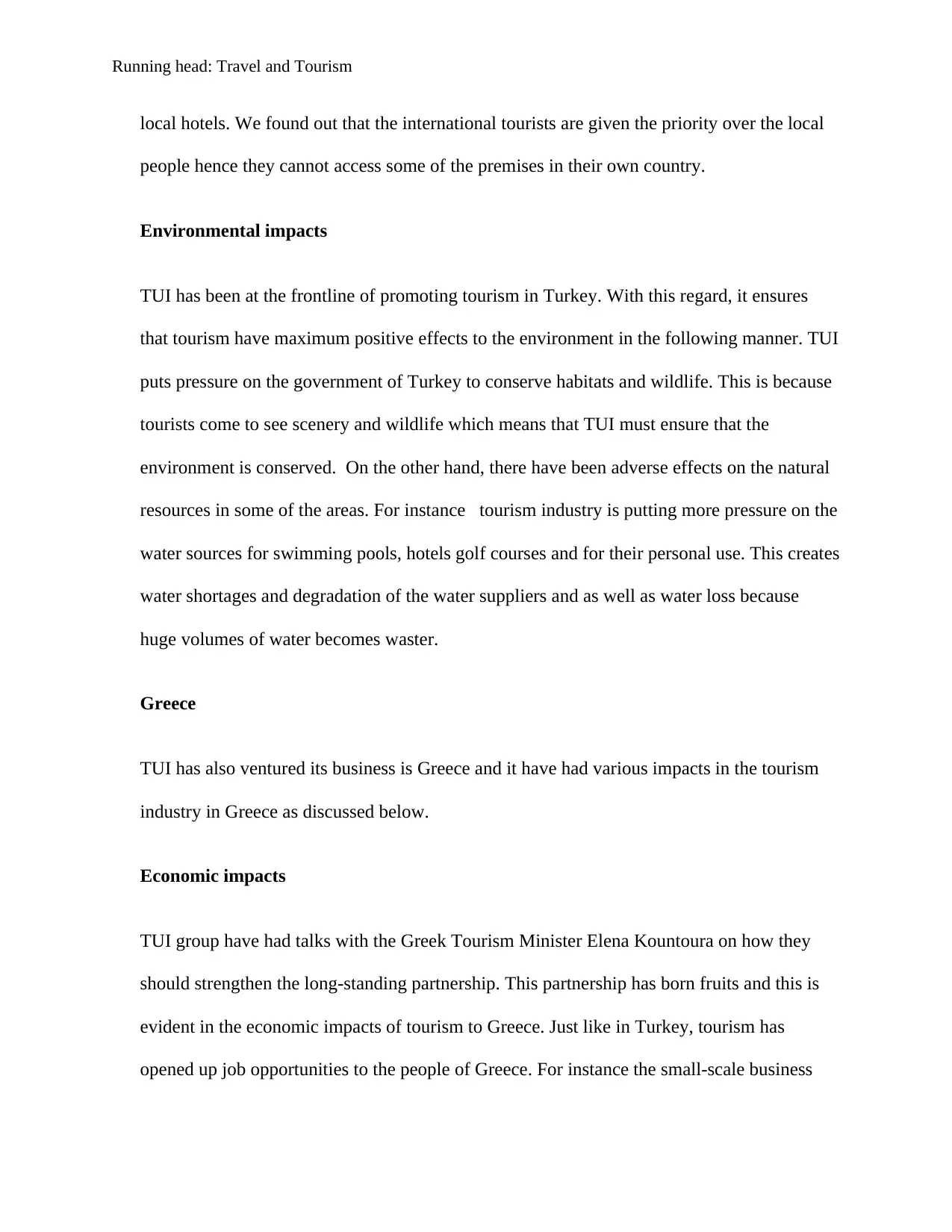
Running head: Travel and Tourism
local hotels. We found out that the international tourists are given the priority over the local
people hence they cannot access some of the premises in their own country.
Environmental impacts
TUI has been at the frontline of promoting tourism in Turkey. With this regard, it ensures
that tourism have maximum positive effects to the environment in the following manner. TUI
puts pressure on the government of Turkey to conserve habitats and wildlife. This is because
tourists come to see scenery and wildlife which means that TUI must ensure that the
environment is conserved. On the other hand, there have been adverse effects on the natural
resources in some of the areas. For instance tourism industry is putting more pressure on the
water sources for swimming pools, hotels golf courses and for their personal use. This creates
water shortages and degradation of the water suppliers and as well as water loss because
huge volumes of water becomes waster.
Greece
TUI has also ventured its business is Greece and it have had various impacts in the tourism
industry in Greece as discussed below.
Economic impacts
TUI group have had talks with the Greek Tourism Minister Elena Kountoura on how they
should strengthen the long-standing partnership. This partnership has born fruits and this is
evident in the economic impacts of tourism to Greece. Just like in Turkey, tourism has
opened up job opportunities to the people of Greece. For instance the small-scale business
local hotels. We found out that the international tourists are given the priority over the local
people hence they cannot access some of the premises in their own country.
Environmental impacts
TUI has been at the frontline of promoting tourism in Turkey. With this regard, it ensures
that tourism have maximum positive effects to the environment in the following manner. TUI
puts pressure on the government of Turkey to conserve habitats and wildlife. This is because
tourists come to see scenery and wildlife which means that TUI must ensure that the
environment is conserved. On the other hand, there have been adverse effects on the natural
resources in some of the areas. For instance tourism industry is putting more pressure on the
water sources for swimming pools, hotels golf courses and for their personal use. This creates
water shortages and degradation of the water suppliers and as well as water loss because
huge volumes of water becomes waster.
Greece
TUI has also ventured its business is Greece and it have had various impacts in the tourism
industry in Greece as discussed below.
Economic impacts
TUI group have had talks with the Greek Tourism Minister Elena Kountoura on how they
should strengthen the long-standing partnership. This partnership has born fruits and this is
evident in the economic impacts of tourism to Greece. Just like in Turkey, tourism has
opened up job opportunities to the people of Greece. For instance the small-scale business
Paraphrase This Document
Need a fresh take? Get an instant paraphrase of this document with our AI Paraphraser
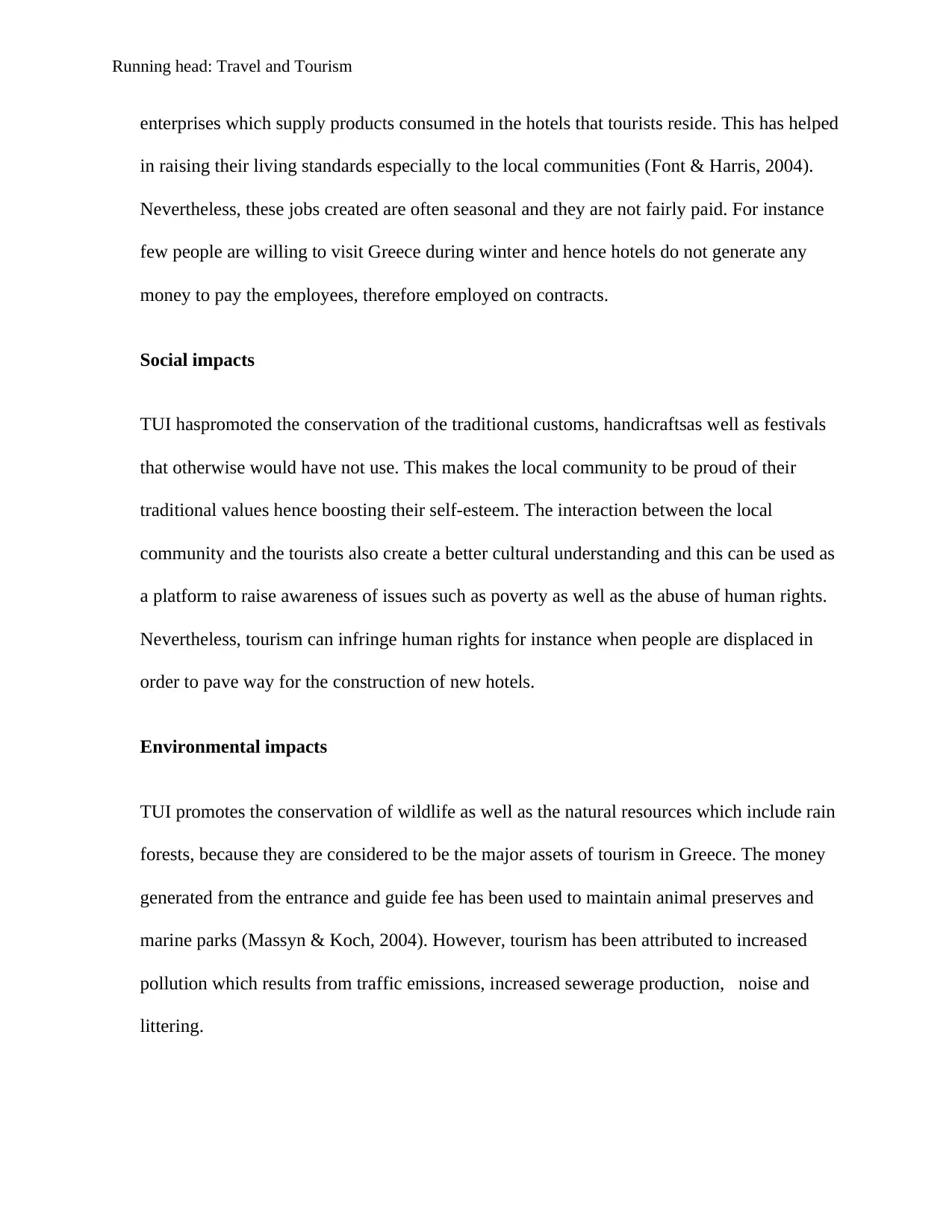
Running head: Travel and Tourism
enterprises which supply products consumed in the hotels that tourists reside. This has helped
in raising their living standards especially to the local communities (Font & Harris, 2004).
Nevertheless, these jobs created are often seasonal and they are not fairly paid. For instance
few people are willing to visit Greece during winter and hence hotels do not generate any
money to pay the employees, therefore employed on contracts.
Social impacts
TUI haspromoted the conservation of the traditional customs, handicraftsas well as festivals
that otherwise would have not use. This makes the local community to be proud of their
traditional values hence boosting their self-esteem. The interaction between the local
community and the tourists also create a better cultural understanding and this can be used as
a platform to raise awareness of issues such as poverty as well as the abuse of human rights.
Nevertheless, tourism can infringe human rights for instance when people are displaced in
order to pave way for the construction of new hotels.
Environmental impacts
TUI promotes the conservation of wildlife as well as the natural resources which include rain
forests, because they are considered to be the major assets of tourism in Greece. The money
generated from the entrance and guide fee has been used to maintain animal preserves and
marine parks (Massyn & Koch, 2004). However, tourism has been attributed to increased
pollution which results from traffic emissions, increased sewerage production, noise and
littering.
enterprises which supply products consumed in the hotels that tourists reside. This has helped
in raising their living standards especially to the local communities (Font & Harris, 2004).
Nevertheless, these jobs created are often seasonal and they are not fairly paid. For instance
few people are willing to visit Greece during winter and hence hotels do not generate any
money to pay the employees, therefore employed on contracts.
Social impacts
TUI haspromoted the conservation of the traditional customs, handicraftsas well as festivals
that otherwise would have not use. This makes the local community to be proud of their
traditional values hence boosting their self-esteem. The interaction between the local
community and the tourists also create a better cultural understanding and this can be used as
a platform to raise awareness of issues such as poverty as well as the abuse of human rights.
Nevertheless, tourism can infringe human rights for instance when people are displaced in
order to pave way for the construction of new hotels.
Environmental impacts
TUI promotes the conservation of wildlife as well as the natural resources which include rain
forests, because they are considered to be the major assets of tourism in Greece. The money
generated from the entrance and guide fee has been used to maintain animal preserves and
marine parks (Massyn & Koch, 2004). However, tourism has been attributed to increased
pollution which results from traffic emissions, increased sewerage production, noise and
littering.
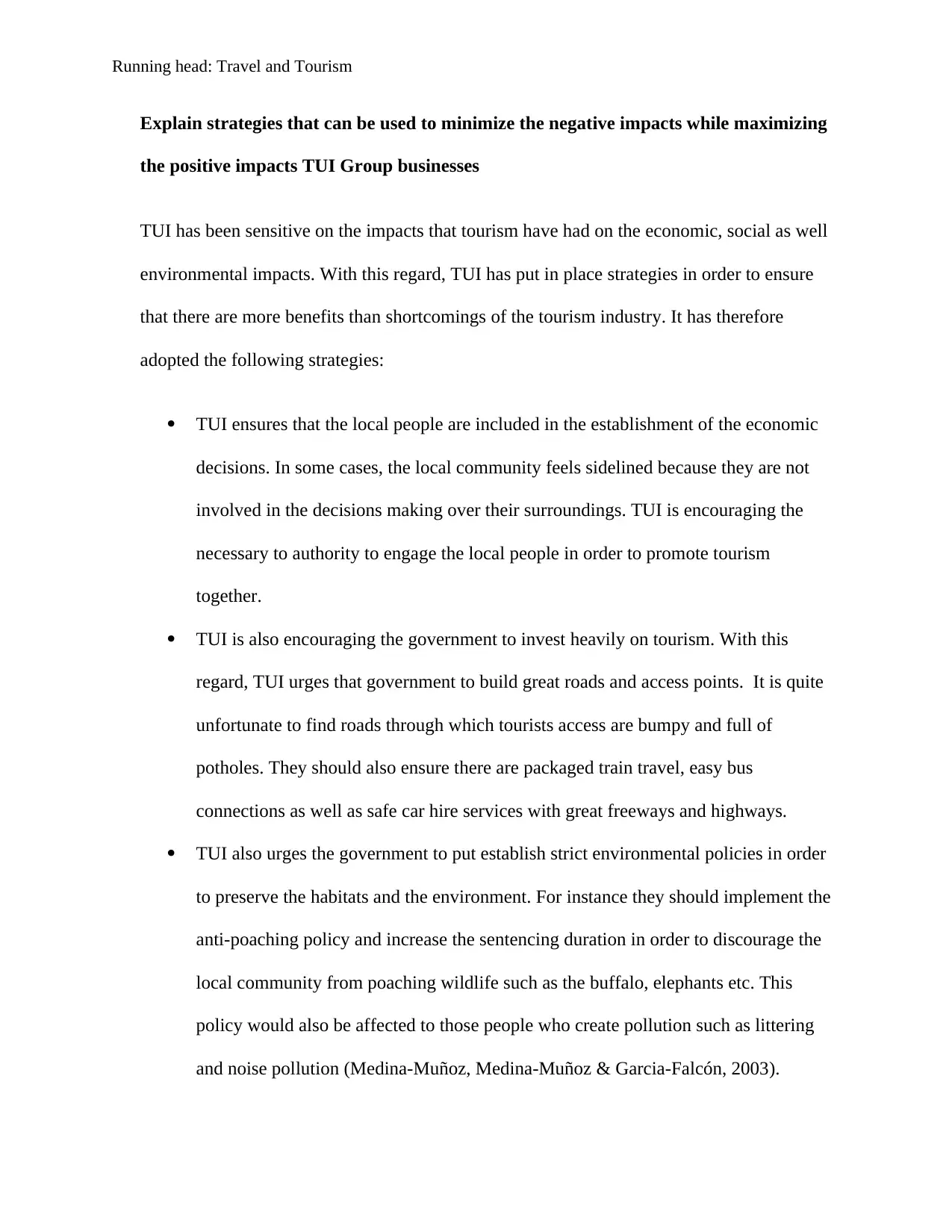
Running head: Travel and Tourism
Explain strategies that can be used to minimize the negative impacts while maximizing
the positive impacts TUI Group businesses
TUI has been sensitive on the impacts that tourism have had on the economic, social as well
environmental impacts. With this regard, TUI has put in place strategies in order to ensure
that there are more benefits than shortcomings of the tourism industry. It has therefore
adopted the following strategies:
TUI ensures that the local people are included in the establishment of the economic
decisions. In some cases, the local community feels sidelined because they are not
involved in the decisions making over their surroundings. TUI is encouraging the
necessary to authority to engage the local people in order to promote tourism
together.
TUI is also encouraging the government to invest heavily on tourism. With this
regard, TUI urges that government to build great roads and access points. It is quite
unfortunate to find roads through which tourists access are bumpy and full of
potholes. They should also ensure there are packaged train travel, easy bus
connections as well as safe car hire services with great freeways and highways.
TUI also urges the government to put establish strict environmental policies in order
to preserve the habitats and the environment. For instance they should implement the
anti-poaching policy and increase the sentencing duration in order to discourage the
local community from poaching wildlife such as the buffalo, elephants etc. This
policy would also be affected to those people who create pollution such as littering
and noise pollution (Medina-Muñoz, Medina-Muñoz & Garcia-Falcón, 2003).
Explain strategies that can be used to minimize the negative impacts while maximizing
the positive impacts TUI Group businesses
TUI has been sensitive on the impacts that tourism have had on the economic, social as well
environmental impacts. With this regard, TUI has put in place strategies in order to ensure
that there are more benefits than shortcomings of the tourism industry. It has therefore
adopted the following strategies:
TUI ensures that the local people are included in the establishment of the economic
decisions. In some cases, the local community feels sidelined because they are not
involved in the decisions making over their surroundings. TUI is encouraging the
necessary to authority to engage the local people in order to promote tourism
together.
TUI is also encouraging the government to invest heavily on tourism. With this
regard, TUI urges that government to build great roads and access points. It is quite
unfortunate to find roads through which tourists access are bumpy and full of
potholes. They should also ensure there are packaged train travel, easy bus
connections as well as safe car hire services with great freeways and highways.
TUI also urges the government to put establish strict environmental policies in order
to preserve the habitats and the environment. For instance they should implement the
anti-poaching policy and increase the sentencing duration in order to discourage the
local community from poaching wildlife such as the buffalo, elephants etc. This
policy would also be affected to those people who create pollution such as littering
and noise pollution (Medina-Muñoz, Medina-Muñoz & Garcia-Falcón, 2003).
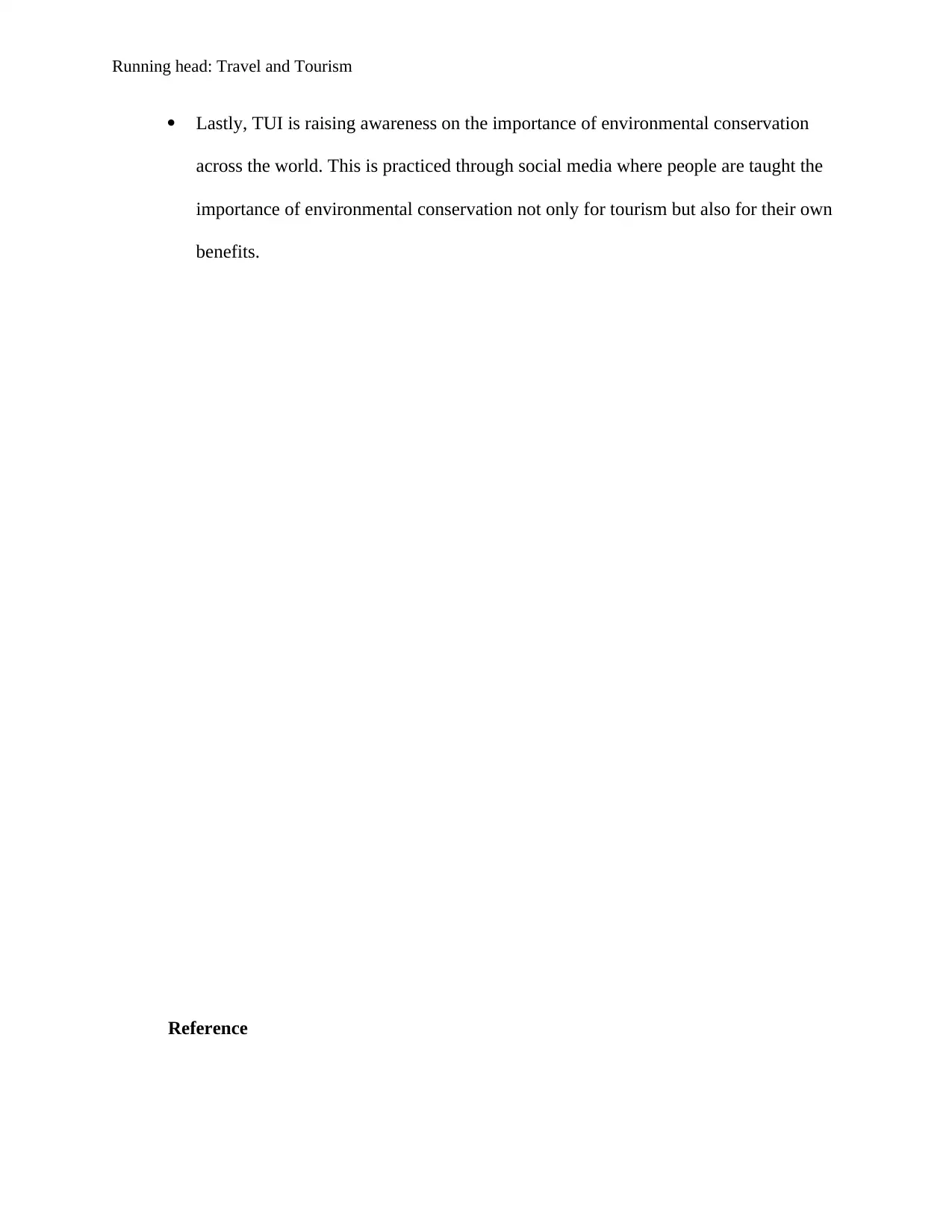
Running head: Travel and Tourism
Lastly, TUI is raising awareness on the importance of environmental conservation
across the world. This is practiced through social media where people are taught the
importance of environmental conservation not only for tourism but also for their own
benefits.
Reference
Lastly, TUI is raising awareness on the importance of environmental conservation
across the world. This is practiced through social media where people are taught the
importance of environmental conservation not only for tourism but also for their own
benefits.
Reference
Secure Best Marks with AI Grader
Need help grading? Try our AI Grader for instant feedback on your assignments.
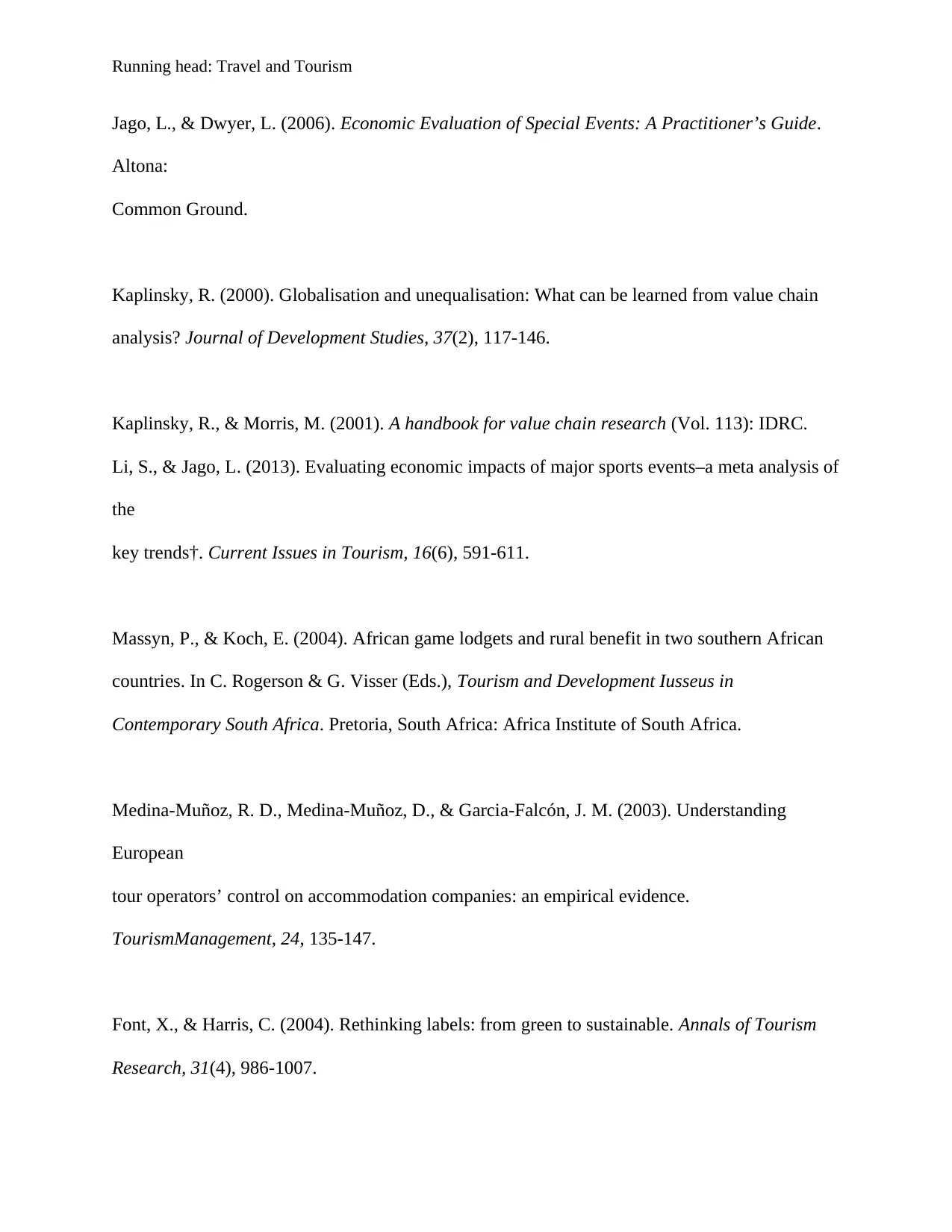
Running head: Travel and Tourism
Jago, L., & Dwyer, L. (2006). Economic Evaluation of Special Events: A Practitioner’s Guide.
Altona:
Common Ground.
Kaplinsky, R. (2000). Globalisation and unequalisation: What can be learned from value chain
analysis? Journal of Development Studies, 37(2), 117-146.
Kaplinsky, R., & Morris, M. (2001). A handbook for value chain research (Vol. 113): IDRC.
Li, S., & Jago, L. (2013). Evaluating economic impacts of major sports events–a meta analysis of
the
key trends†. Current Issues in Tourism, 16(6), 591-611.
Massyn, P., & Koch, E. (2004). African game lodgets and rural benefit in two southern African
countries. In C. Rogerson & G. Visser (Eds.), Tourism and Development Iusseus in
Contemporary South Africa. Pretoria, South Africa: Africa Institute of South Africa.
Medina-Muñoz, R. D., Medina-Muñoz, D., & Garcia-Falcón, J. M. (2003). Understanding
European
tour operators’ control on accommodation companies: an empirical evidence.
TourismManagement, 24, 135-147.
Font, X., & Harris, C. (2004). Rethinking labels: from green to sustainable. Annals of Tourism
Research, 31(4), 986-1007.
Jago, L., & Dwyer, L. (2006). Economic Evaluation of Special Events: A Practitioner’s Guide.
Altona:
Common Ground.
Kaplinsky, R. (2000). Globalisation and unequalisation: What can be learned from value chain
analysis? Journal of Development Studies, 37(2), 117-146.
Kaplinsky, R., & Morris, M. (2001). A handbook for value chain research (Vol. 113): IDRC.
Li, S., & Jago, L. (2013). Evaluating economic impacts of major sports events–a meta analysis of
the
key trends†. Current Issues in Tourism, 16(6), 591-611.
Massyn, P., & Koch, E. (2004). African game lodgets and rural benefit in two southern African
countries. In C. Rogerson & G. Visser (Eds.), Tourism and Development Iusseus in
Contemporary South Africa. Pretoria, South Africa: Africa Institute of South Africa.
Medina-Muñoz, R. D., Medina-Muñoz, D., & Garcia-Falcón, J. M. (2003). Understanding
European
tour operators’ control on accommodation companies: an empirical evidence.
TourismManagement, 24, 135-147.
Font, X., & Harris, C. (2004). Rethinking labels: from green to sustainable. Annals of Tourism
Research, 31(4), 986-1007.
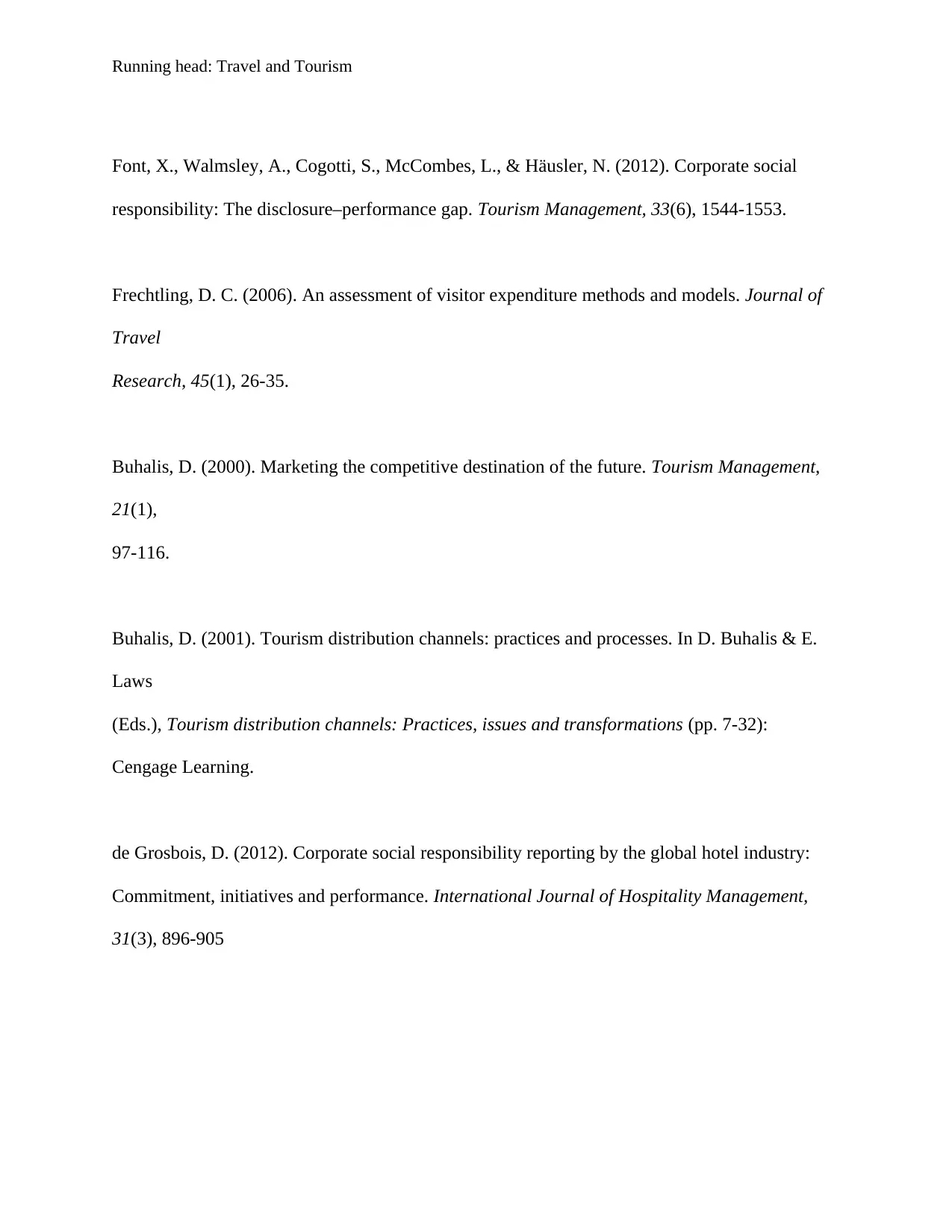
Running head: Travel and Tourism
Font, X., Walmsley, A., Cogotti, S., McCombes, L., & Häusler, N. (2012). Corporate social
responsibility: The disclosure–performance gap. Tourism Management, 33(6), 1544-1553.
Frechtling, D. C. (2006). An assessment of visitor expenditure methods and models. Journal of
Travel
Research, 45(1), 26-35.
Buhalis, D. (2000). Marketing the competitive destination of the future. Tourism Management,
21(1),
97-116.
Buhalis, D. (2001). Tourism distribution channels: practices and processes. In D. Buhalis & E.
Laws
(Eds.), Tourism distribution channels: Practices, issues and transformations (pp. 7-32):
Cengage Learning.
de Grosbois, D. (2012). Corporate social responsibility reporting by the global hotel industry:
Commitment, initiatives and performance. International Journal of Hospitality Management,
31(3), 896-905
Font, X., Walmsley, A., Cogotti, S., McCombes, L., & Häusler, N. (2012). Corporate social
responsibility: The disclosure–performance gap. Tourism Management, 33(6), 1544-1553.
Frechtling, D. C. (2006). An assessment of visitor expenditure methods and models. Journal of
Travel
Research, 45(1), 26-35.
Buhalis, D. (2000). Marketing the competitive destination of the future. Tourism Management,
21(1),
97-116.
Buhalis, D. (2001). Tourism distribution channels: practices and processes. In D. Buhalis & E.
Laws
(Eds.), Tourism distribution channels: Practices, issues and transformations (pp. 7-32):
Cengage Learning.
de Grosbois, D. (2012). Corporate social responsibility reporting by the global hotel industry:
Commitment, initiatives and performance. International Journal of Hospitality Management,
31(3), 896-905
1 out of 24
Related Documents
Your All-in-One AI-Powered Toolkit for Academic Success.
+13062052269
info@desklib.com
Available 24*7 on WhatsApp / Email
![[object Object]](/_next/static/media/star-bottom.7253800d.svg)
Unlock your academic potential
© 2024 | Zucol Services PVT LTD | All rights reserved.




